Special Report
Most Americans Will Struggle to Pronounce These 50 Town Names
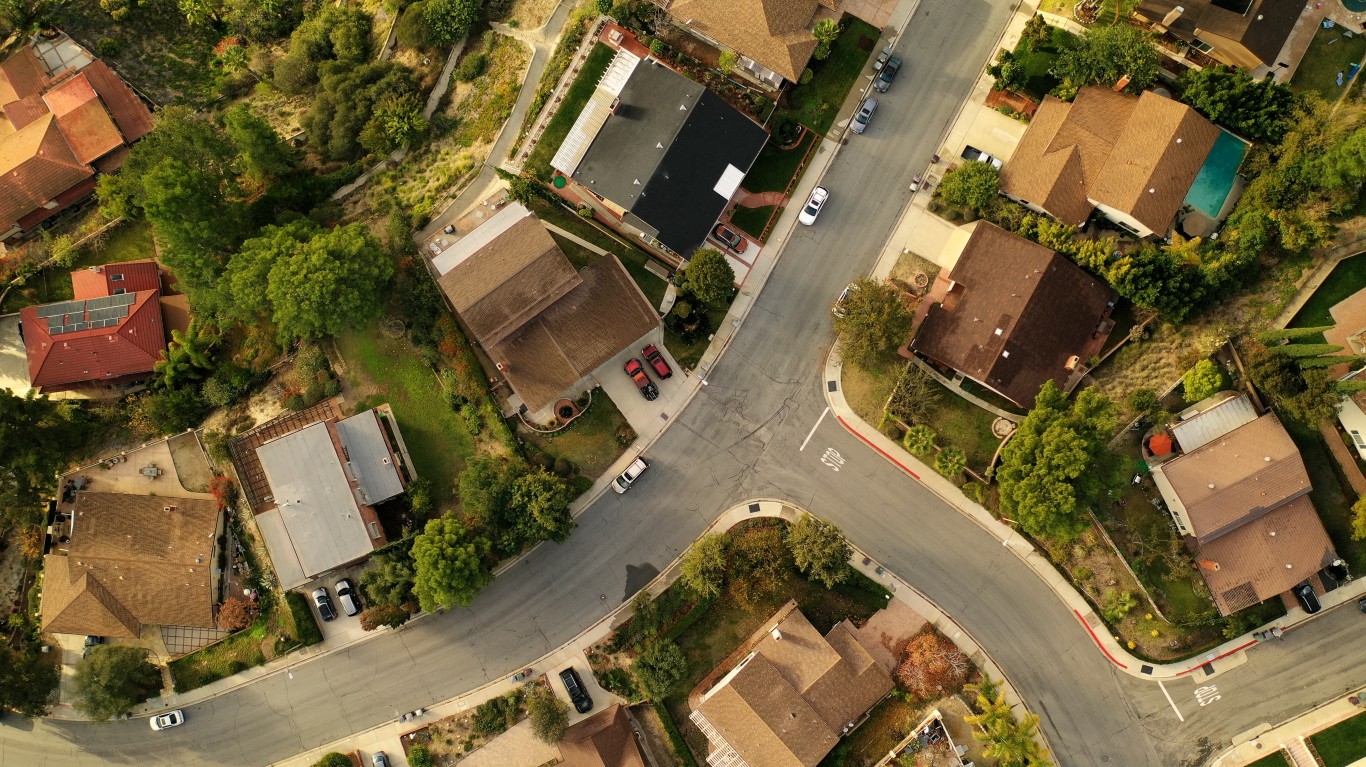
Published:
Last Updated:

Most people probably know how to pronounce Des Moines or Boise. That’s because these are well-known American cities. But people might have mispronounced them when they came across them for the first time. There are a lot more obscure places with strange names that people have a hard time with.
The United States Geological Survey recognizes 35,000 cities and towns in the 50 states. Some began as Native American settlements, while others were founded by immigrants from different parts of the world. Some were named for geographic features and others were named after tribes or individuals. A few were even given made-up names. These are the most common town names in America.
North America (excluding Mexico) has almost 300 indigenous languages, and waves of immigrants from non-English speaking countries added their own. Often, the names immigrants gave to people and places were anglicized. Meanwhile, English itself has been evolving — as all languages do — and pronunciations changing. As a result, there are many towns across the country with names that are difficult to pronounce — and that may even be pronounced differently by the locals. 24/7 Tempo set out to identify the most difficult-to-pronounce town name in each state.
Click here for some of the most difficult town names to pronounce.
To identify the most difficult-to-pronounce town name in each state 24/7 Tempo reviewed the names of more than 29,000 towns as they are listed in the U.S. Census Bureau’s 2017 American Community Survey (ACS). We used editorial discretion to decide which ones are among the most difficult to pronounce.
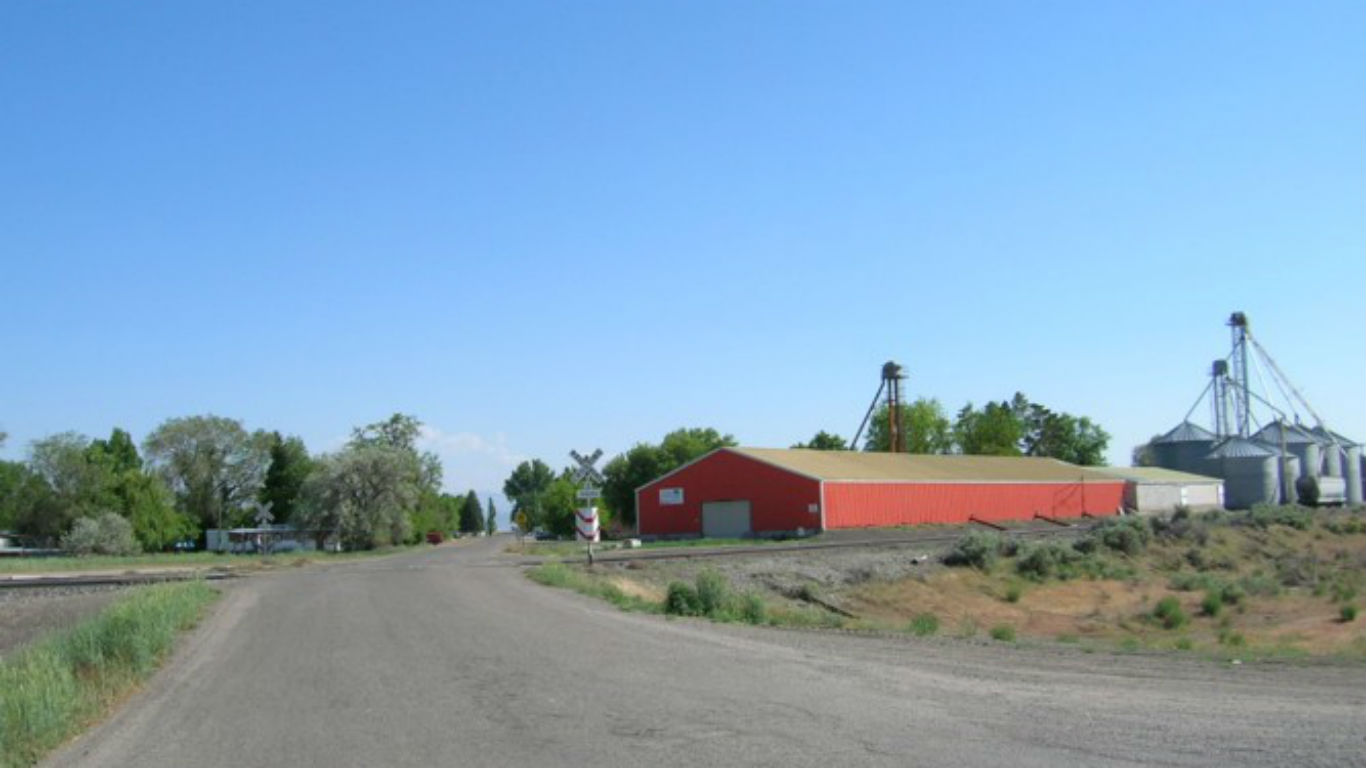
1. Acequia, Idaho
> Total characters: 7
> Total vowels: 5
> Population: 170
Acequia is named after the Spanish word for irrigation ditch — the area has an extensive irrigation system — and is pronounced the same way: “uh-SEEK-we-uh.” If you don’t pronounce it correctly, don’t worry, as the town only has a population of 124.
[in-text-ad]
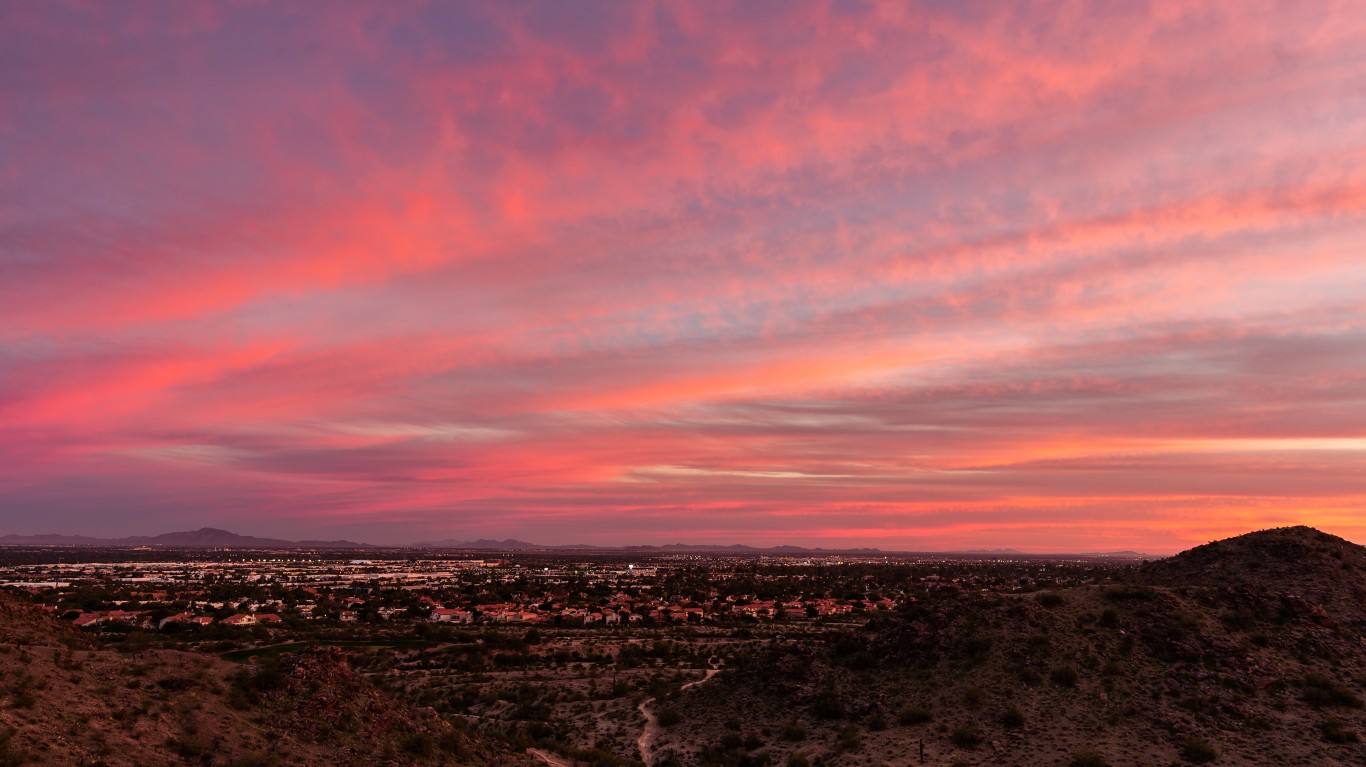
2. Ahwatukee, Arizona
> Total characters: 9
> Total vowels: 5
> Population: N/A
Ahwatukee, an urban village in south Phoenix, is pronounced “ah-wuh-too-kee.”
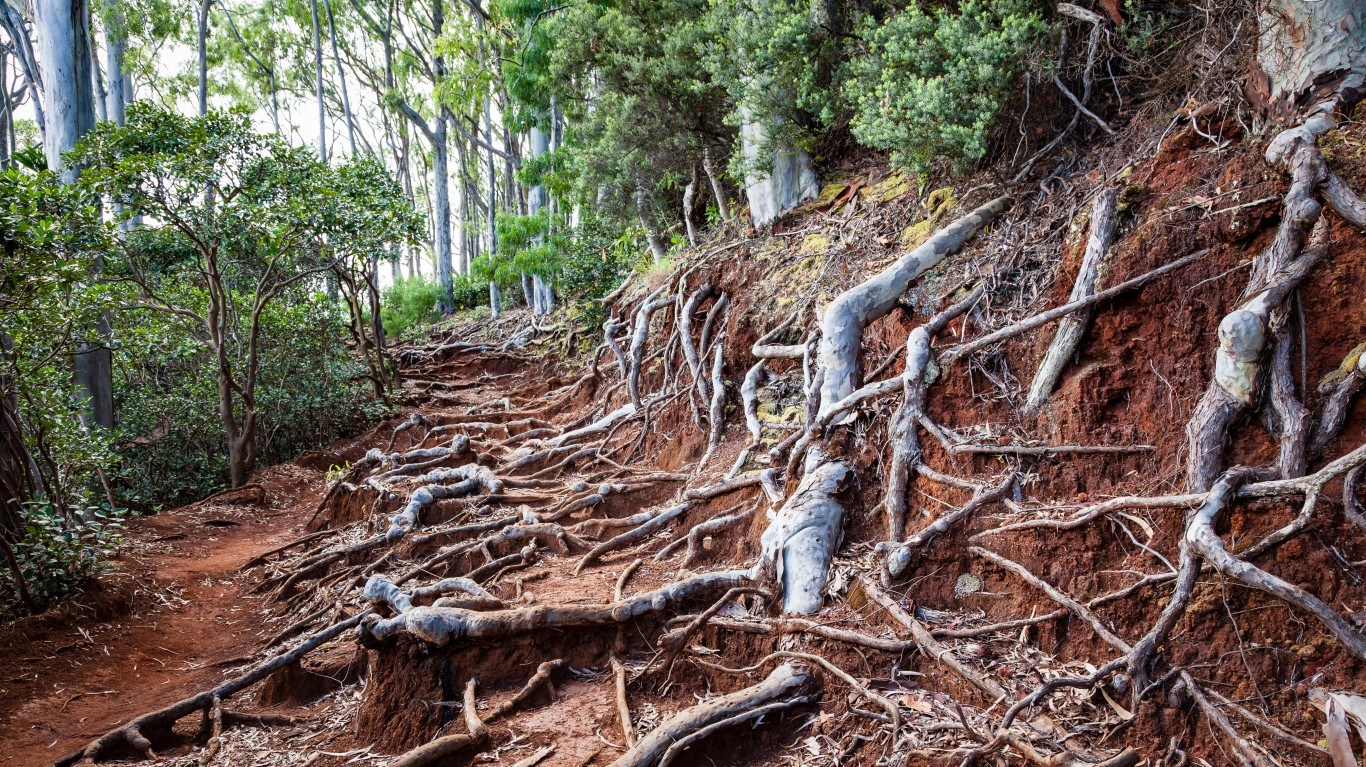
3. Aiea, Hawaii
> Total characters: 4
> Total vowels: 4
> Population: 9,332
Aiea gets its name from the Hawaiian language and is pronounced “ah-ee-ay-ah” or “eye-ay-ah.” It’s part of Honolulu and close to Pearl Harbor, so there’s lots to see nearby.
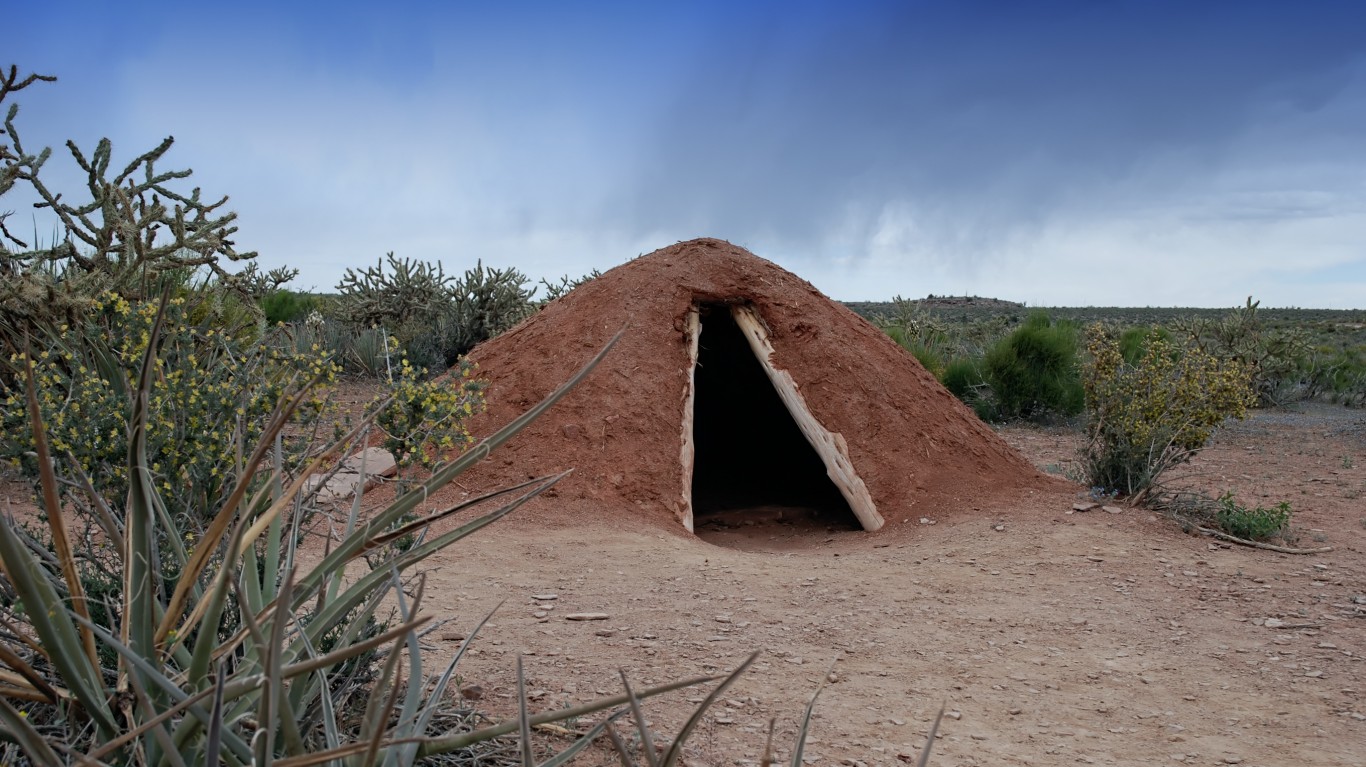
4. Arapahoe, Wyoming
> Total characters: 8
> Total vowels: 5
> Population: 1,586
Arapahoe is situated within the Wind River Indian Reservation, which is home to the Eastern Shoshone and Northern Arapaho tribes. It’s not as difficult to pronounce as it might seem — simply “a-RAP-a-hoe.”
[in-text-ad-2]
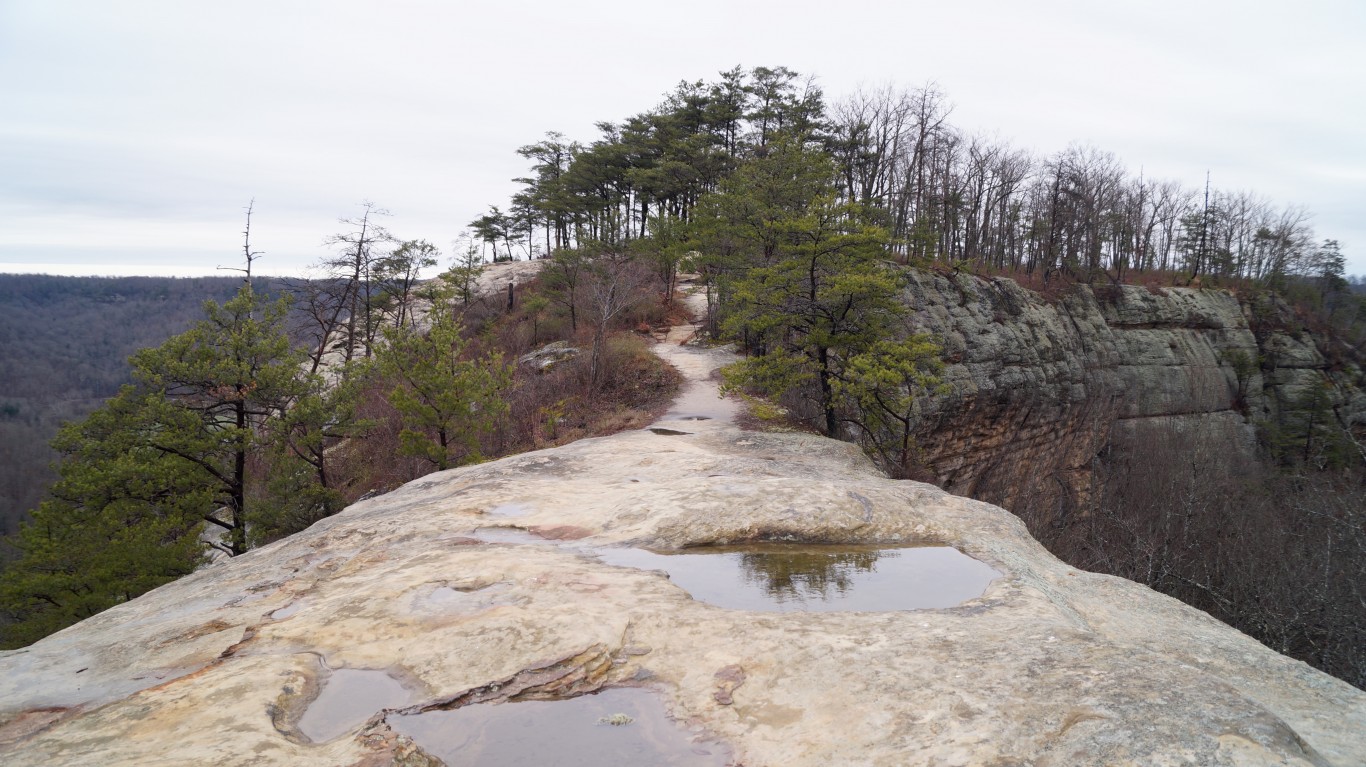
5. Auxier, Kentucky
> Total characters: 6
> Total vowels: 4
> Population: 850
This one’s a challenge: Auxier is named after a family who also used the spelling “Axer,” “Oxer,” and “Auxer.” They pronounced their name “ok-sur,” but some locals use “ox-yer.” Either way, it’s two syllables, not three.
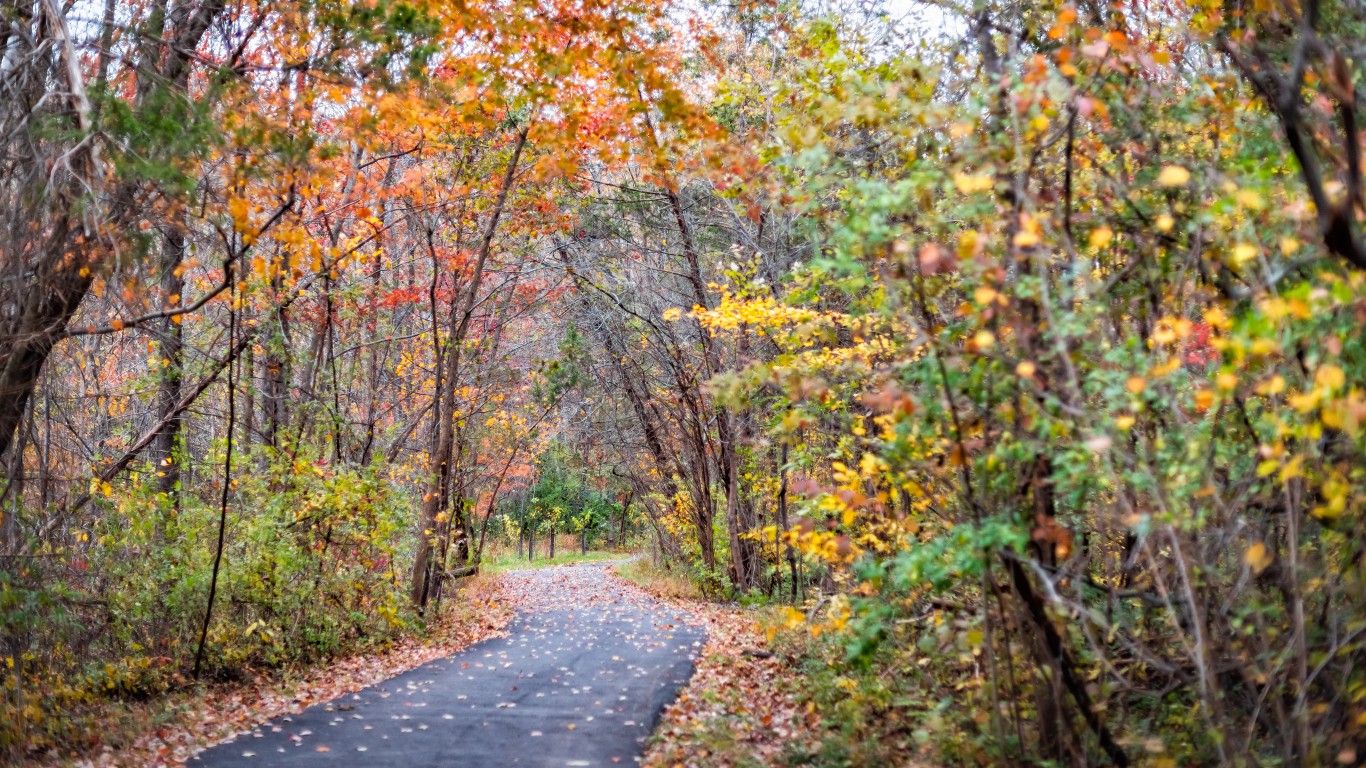
6. Basye, Virginia
> Total characters: 5
> Total vowels: 3
> Population: 834
This town is named after Edmond Basye, an early settler. It is pronounced “BAS-see,” with the accent on the first syllable. It was originally pronounced “bas-SAY,” with the accent on the second syllable.
[in-text-ad]
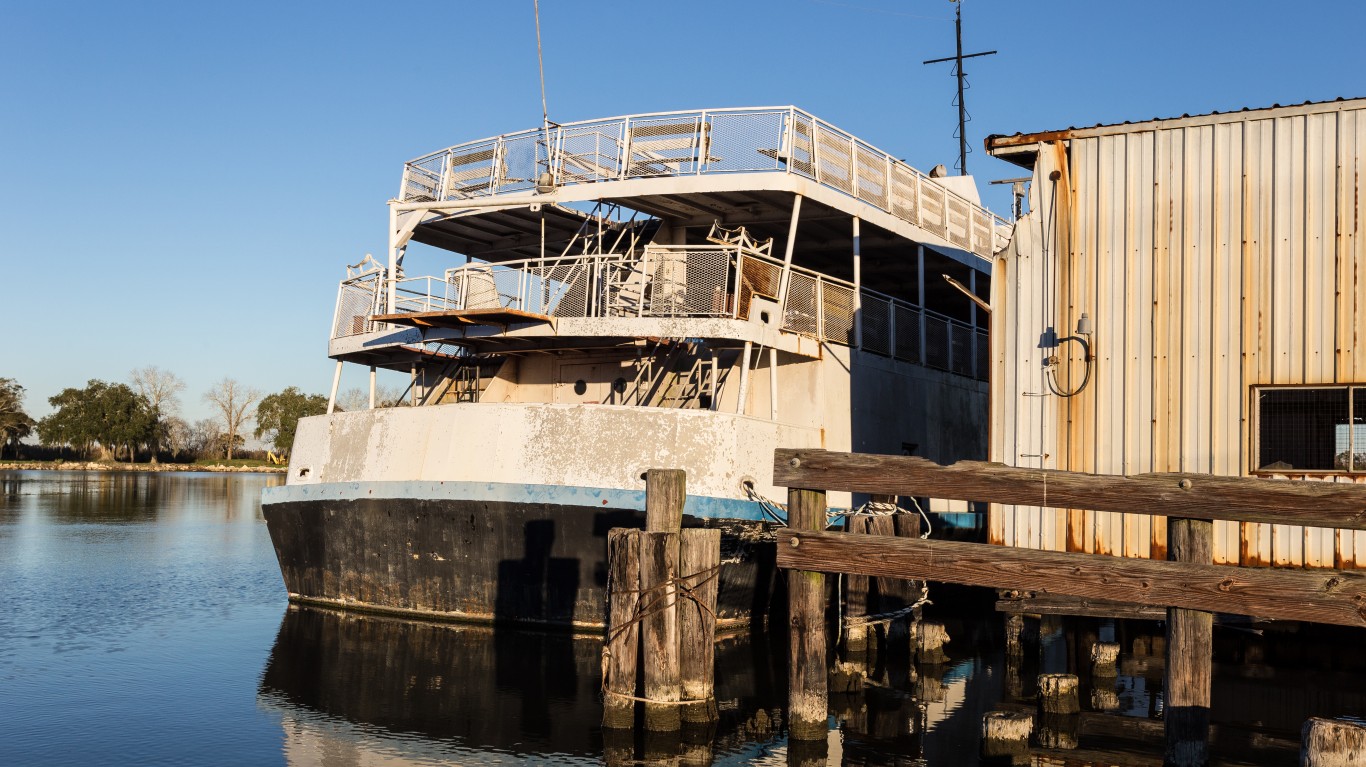
7. Bayou Gauche, Louisiana
> Total characters: 11
> Total vowels: 7
> Population: 2,557
Bayou Gauche is one of the most remote towns in Louisiana, surrounded by water. A bayou is a marshy lake or wetland, and gauche means left in French — meaning the town is on the left side of boats travelling downstream. It is pronounced “bi-YOU” or “bi-OH gosh.”
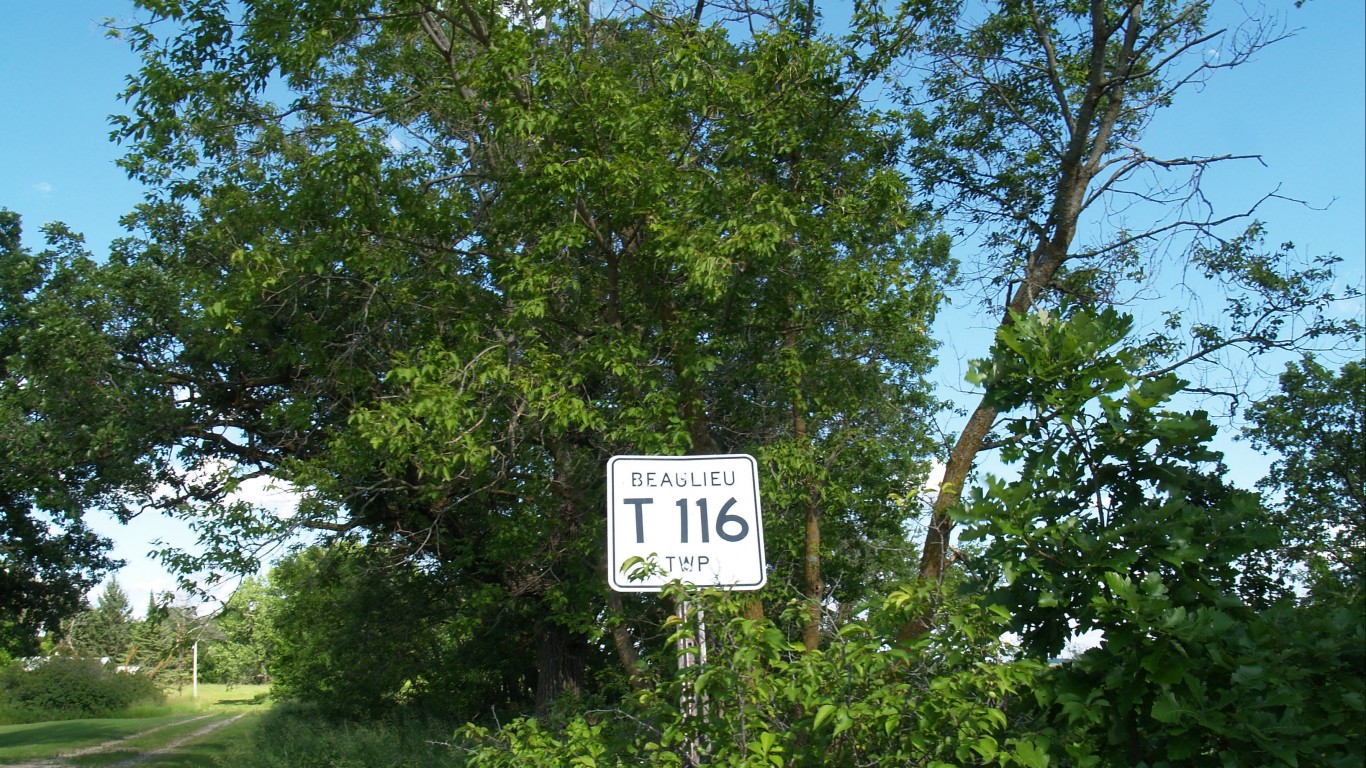
8. Beaulieu, Minnesota
> Total characters: 8
> Total vowels: 6
> Population: 37
Beaulieu is named after brothers Henry and John Beaulieu, who served in the Civil War and later settled there. It is pronounced “bohl-yuu.” The English pronounce this “BEW-lee”.

9. Bucyrus, Ohio
> Total characters: 7
> Total vowels: 3
> Population: 11,950
Bucyrus was founded by Col. James Kilbourne in 1821. He may have come up with the name by combining “beautiful” and Cyrus, the Persian ruler, or he may have named the town after the ancient Egyptian city of Busiris. Whatever the case, it’s pronounced “bew-sy-rus.”
[in-text-ad-2]
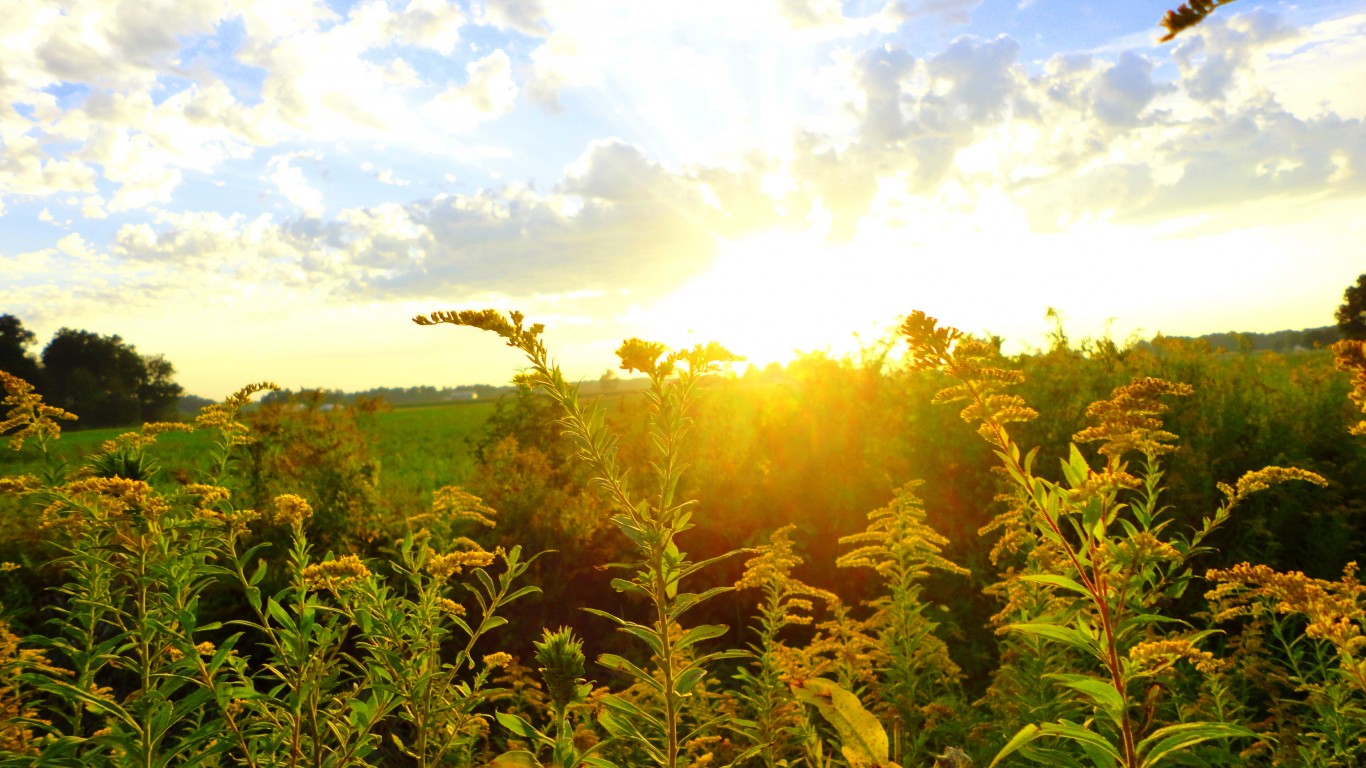
10. Cayuga, Indiana
> Total characters: 6
> Total vowels: 4
> Population: 1,179
Cayuga is pronounced “kye-OO-gah.” It’s named after the Native American tribe that lived in New York State and was forced to migrate westward and northwest.
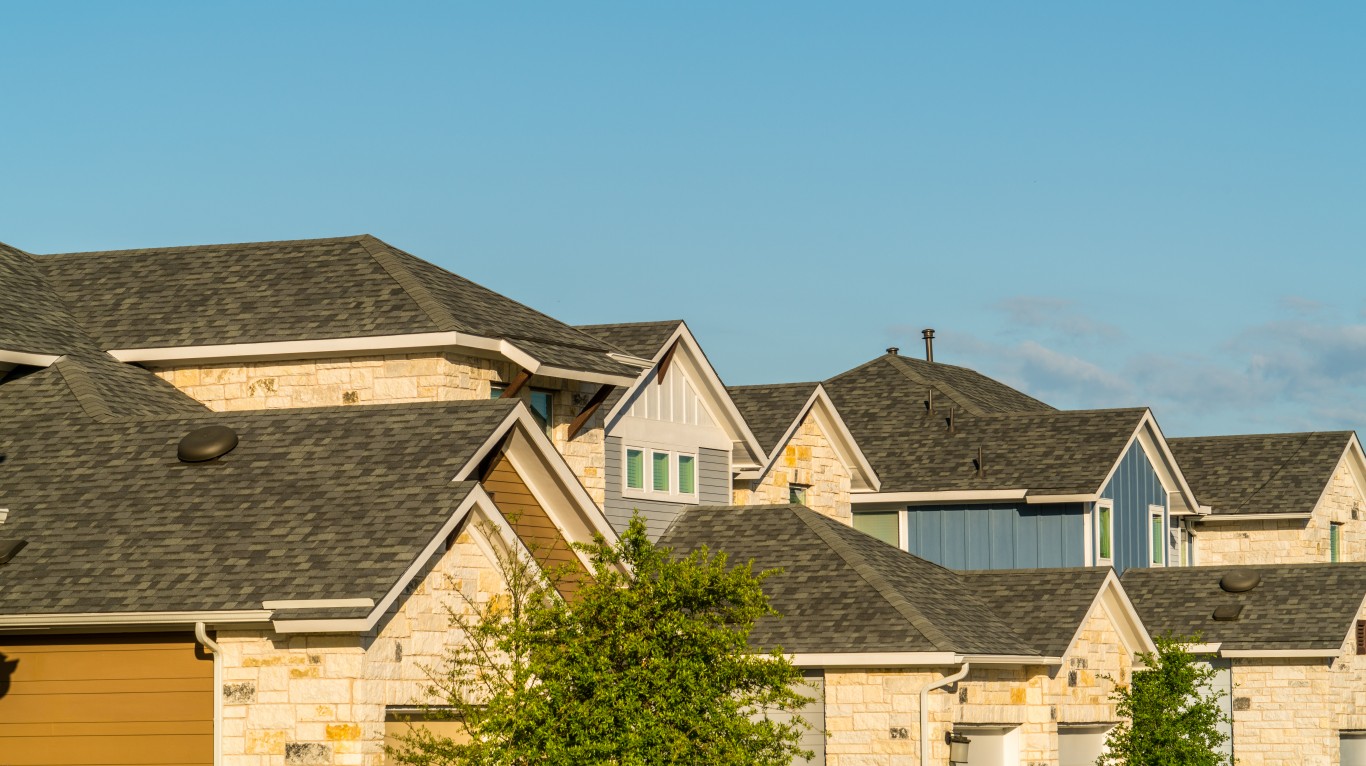
11. César Chávez, Texas, Texas
> Total characters: 11
> Total vowels: 4
> Population: 1,442
Sharing its name with the famous farm worker and activist, this town is pronounced “SEH-sahr CHAH-vess.”
[in-text-ad]
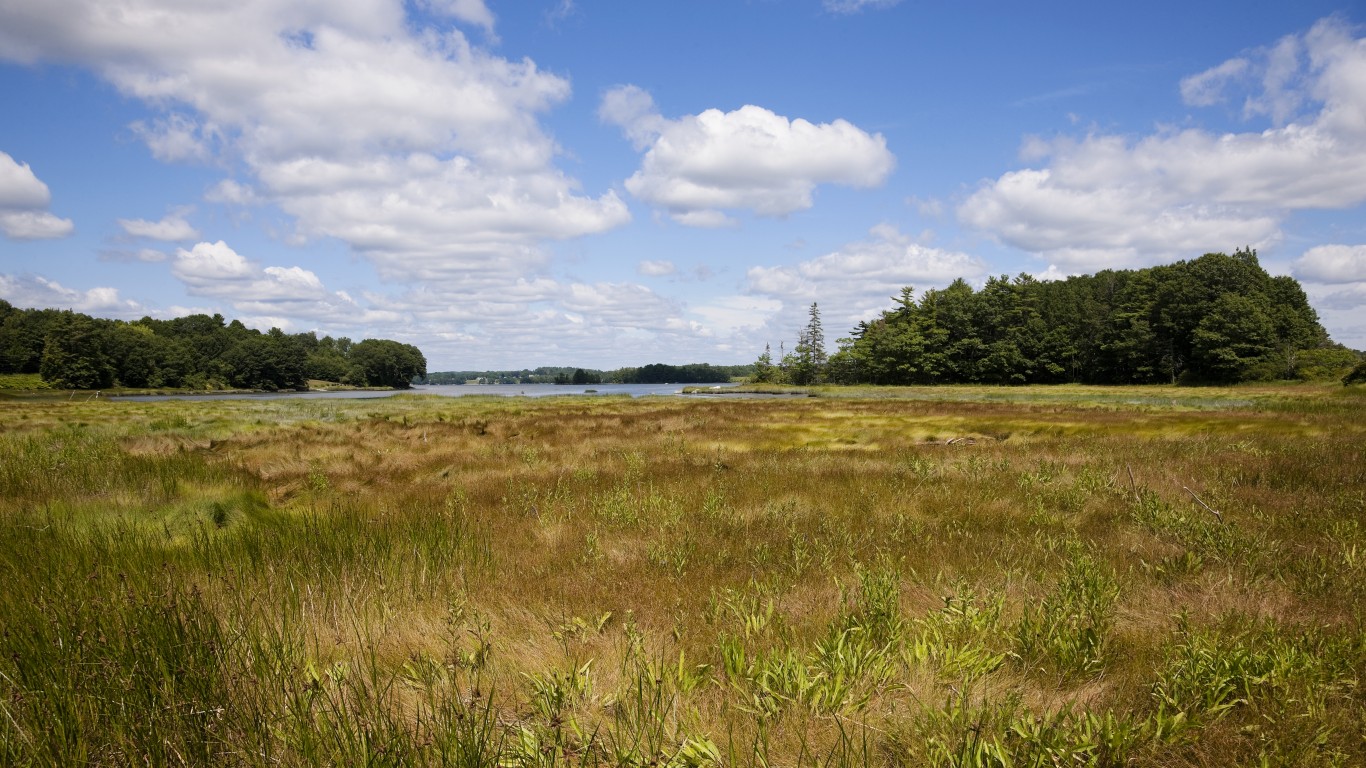
12. Damariscotta, Maine
> Total characters: 12
> Total vowels: 5
> Population: 1,222
Damariscotta reportedly comes from a Native American word meaning “river of little fish.” It is pronounced “dam-ahr-ihs-KOTTA,” although locals sometimes add an extra r to the first syllable.
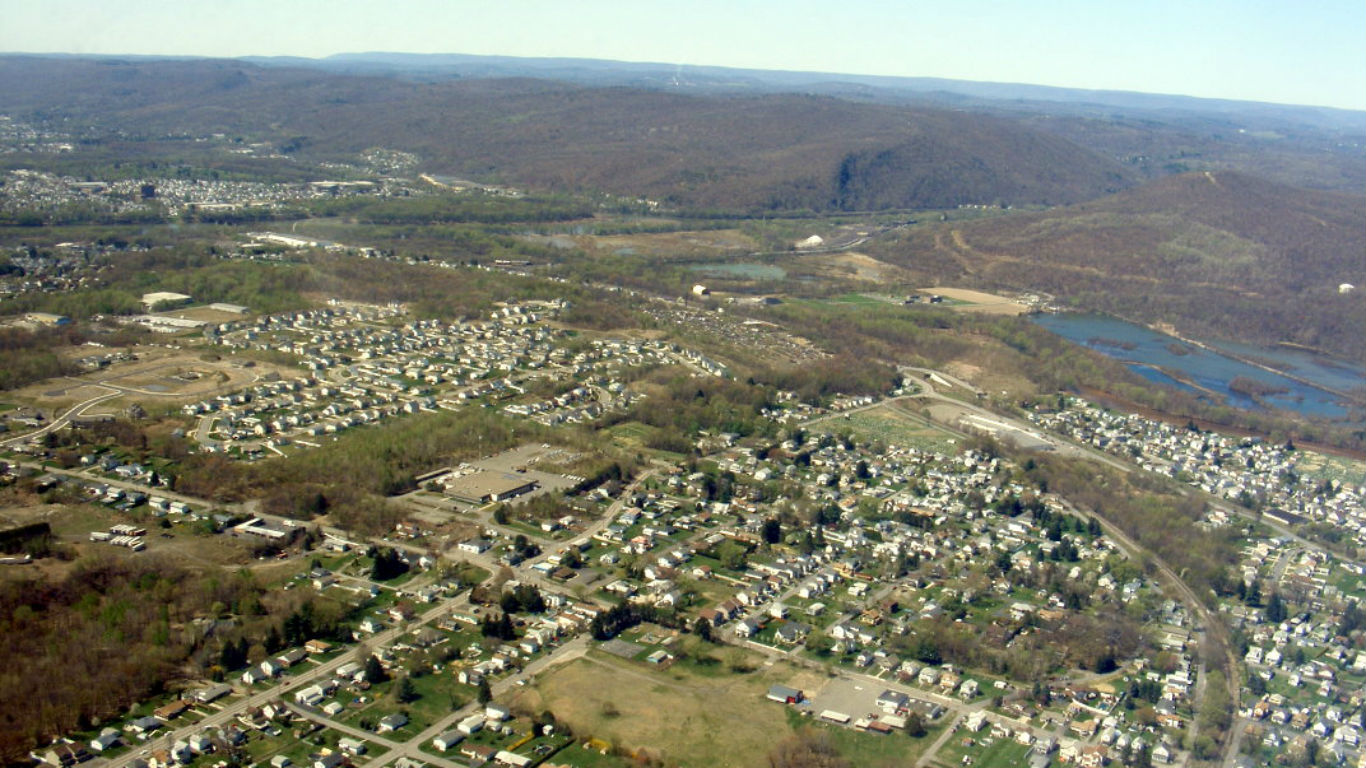
13. Duryea, Pennsylvania
> Total characters: 6
> Total vowels: 4
> Population: 4,886
Duryea was named in honor of Hiram Duryea, a Civil War general and landowner in the area. The name is of Irish origin and is pronounced “dur-ee-ay.”
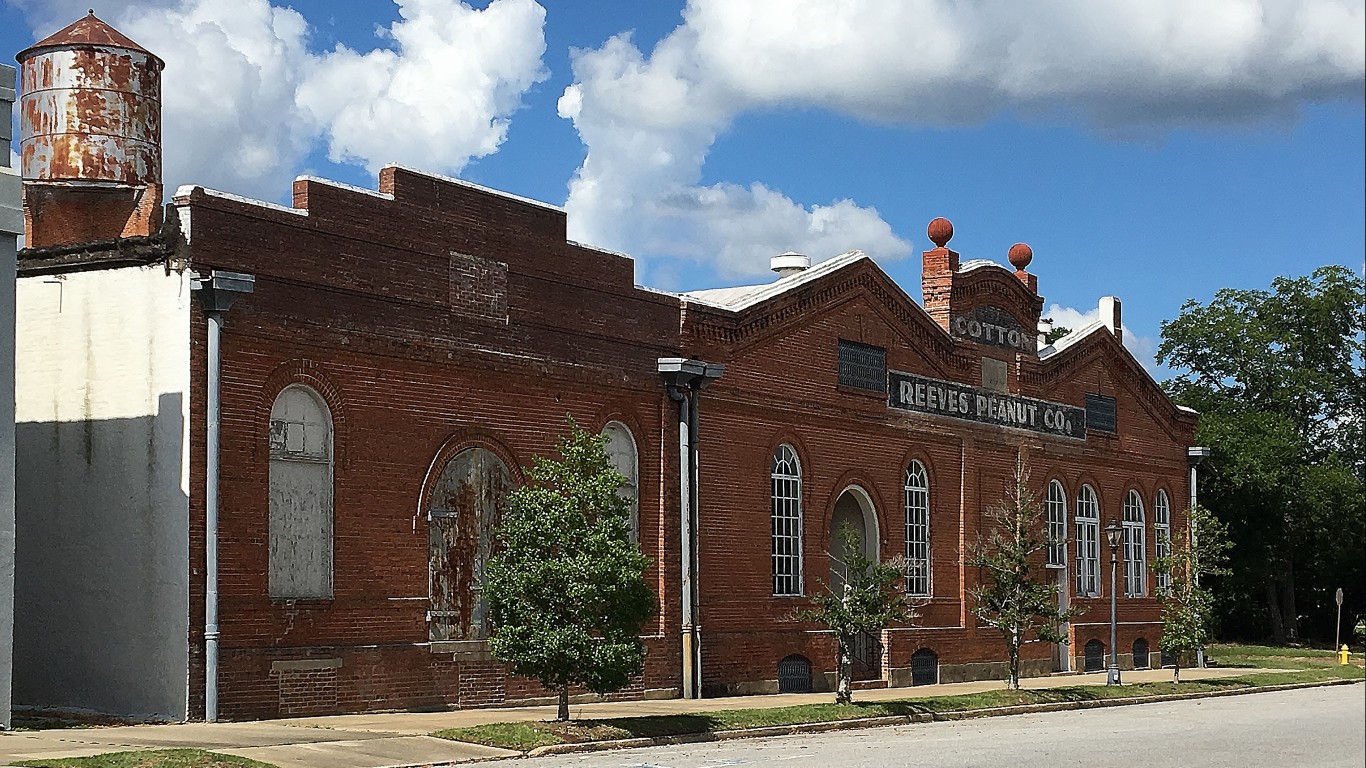
14. Eufaula, Alabama
> Total characters: 7
> Total vowels: 5
> Population: 12,467
Eufaula is named after a Native American tribe and is pronounced “you-fall-uh.”
[in-text-ad-2]
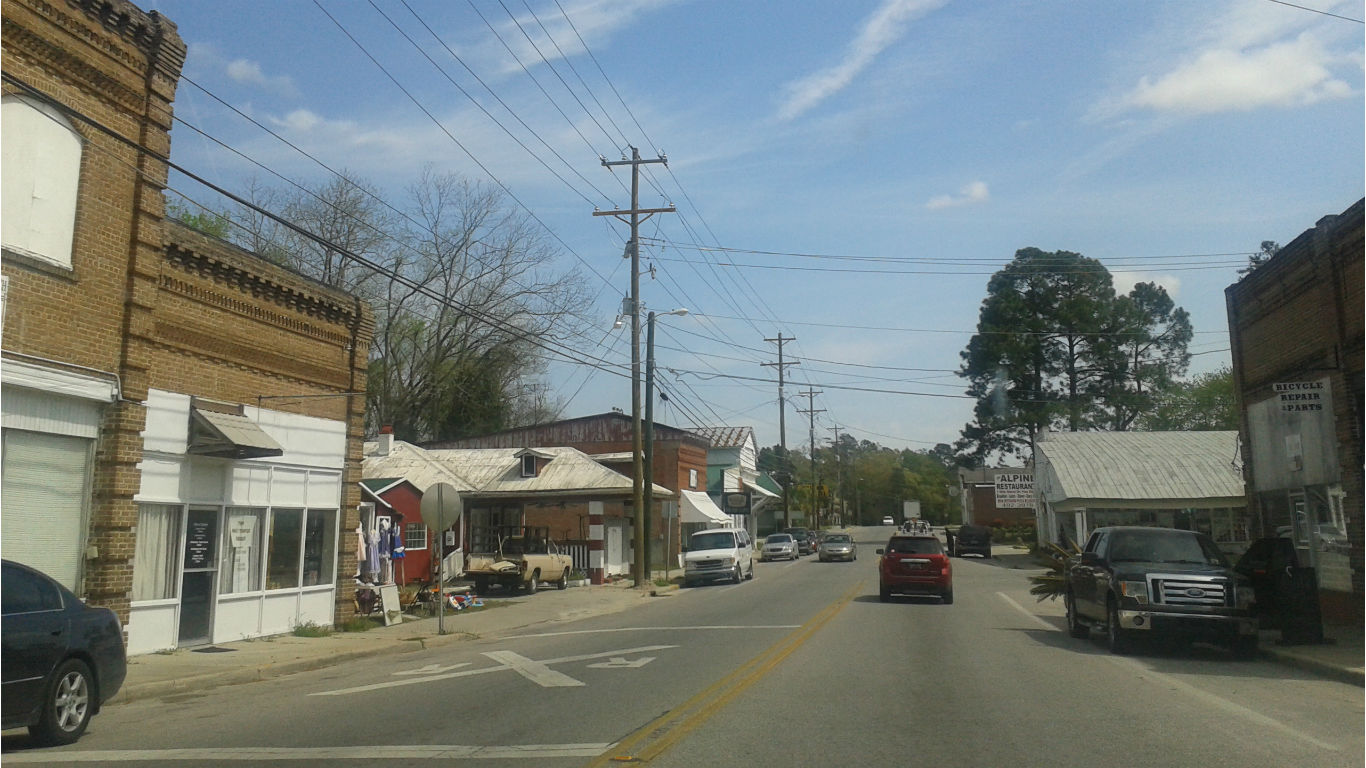
15. Eutawville, South Carolina
> Total characters: 10
> Total vowels: 5
> Population: 312
The first two syllables of Eutawville are pronounced like Utah, and there is less stress on the third, so the result is “YOO-TAH-vil.”
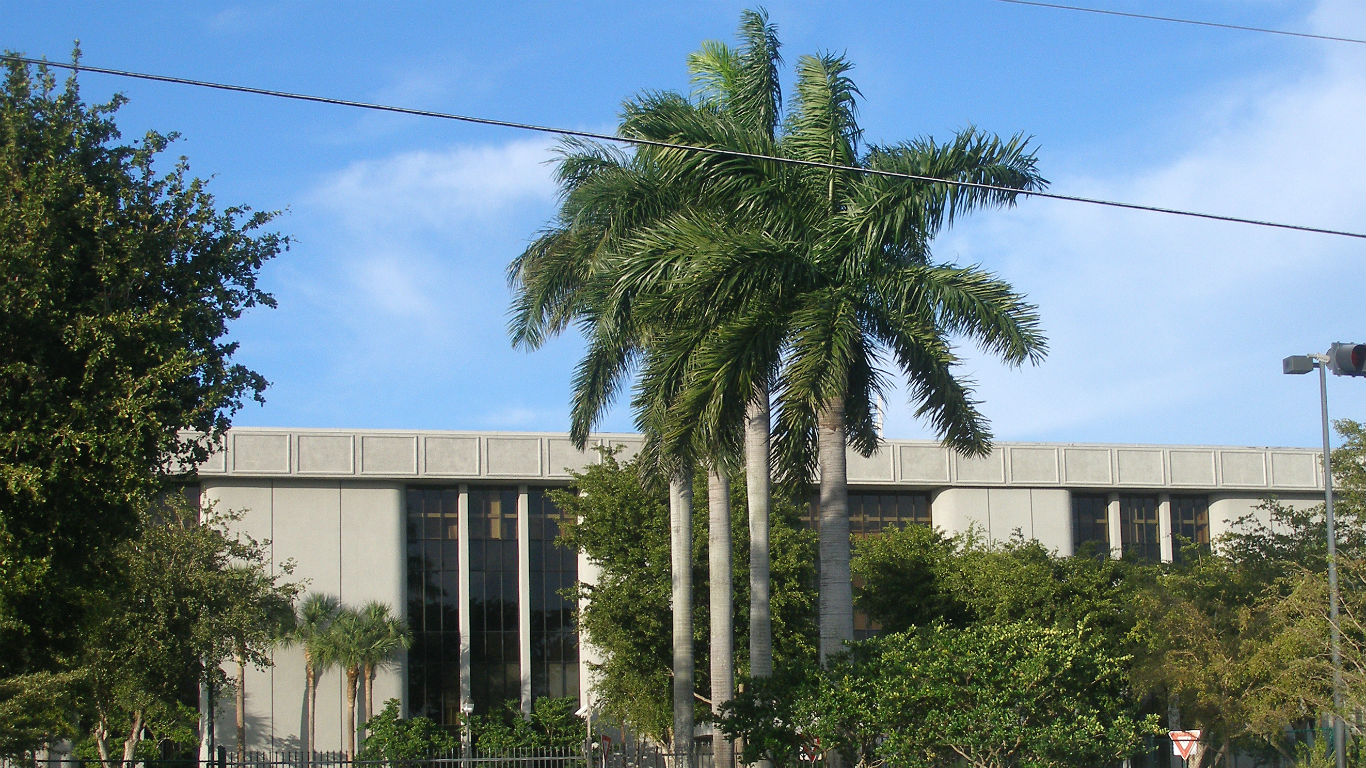
16. Fontainebleau, Florida
> Total characters: 13
> Total vowels: 7
> Population: 59,255
Fontainebleau (also spelled Fountainebleau) is in Miami-Dade County, Florida. The word originated in French, where it is pronounced “fawn-ten-bloh.” In the United States, it can be pronounced “fon-tin-bloh,” although in Florida locals call the hotel of the same name the “Fountain Blue.”
[in-text-ad]
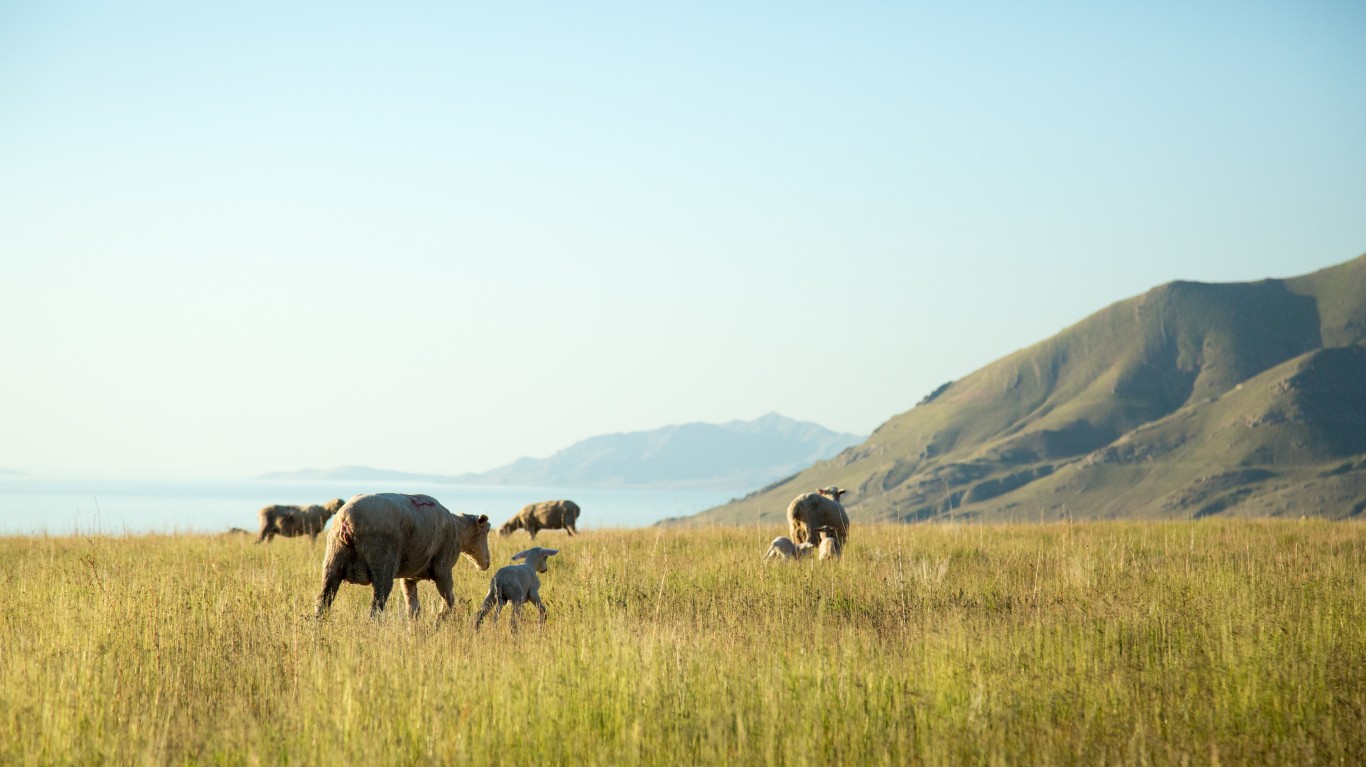
17. Fort Duchesne, Utah
> Total characters: 12
> Total vowels: 4
> Population: 685
Duchesne is pronounced “dushayne.” It is a common French name meaning “of the oak tree.”
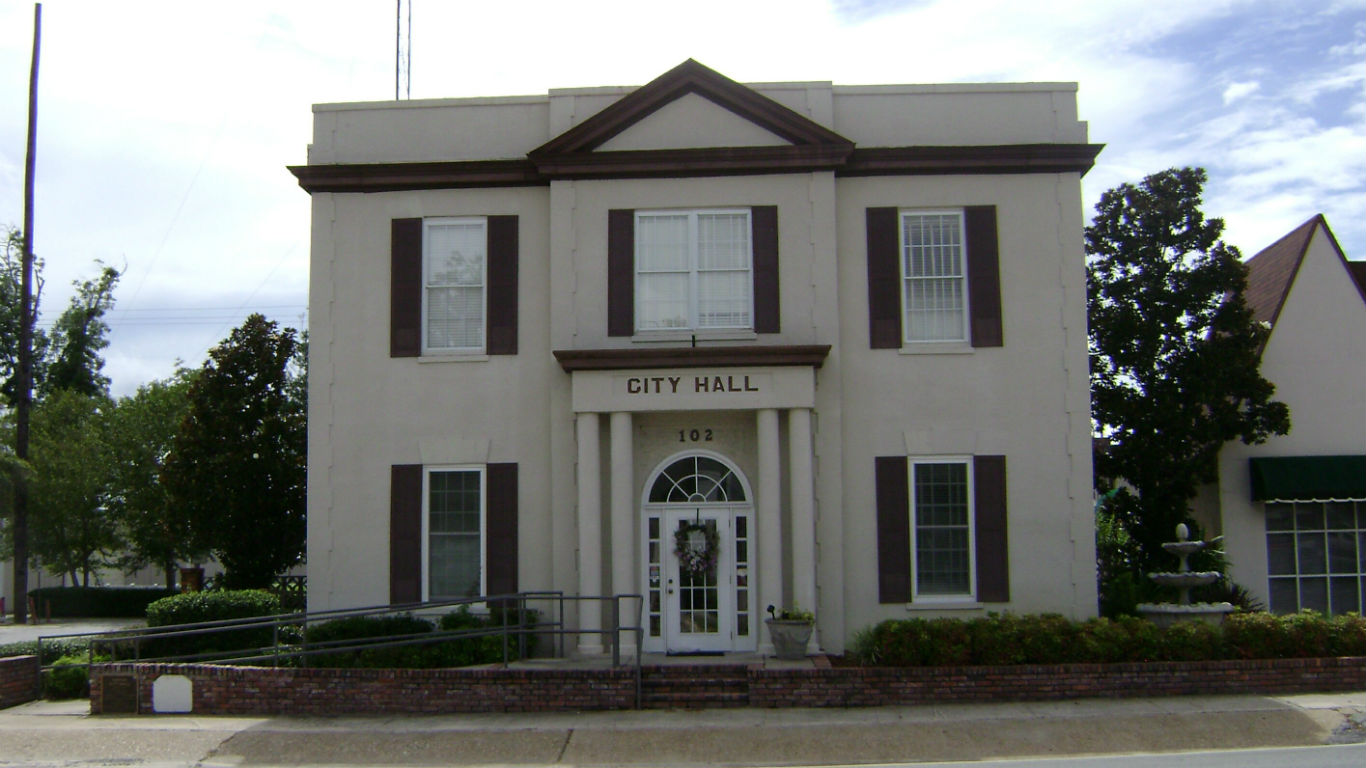
18. Hahira, Georgia
> Total characters: 6
> Total vowels: 3
> Population: 2,894
Hahira (“hay-HI-ra”) has perhaps the most obscure origin of any town on this list. Some say the name was created by the town’s first postmaster, but it remains a mystery.
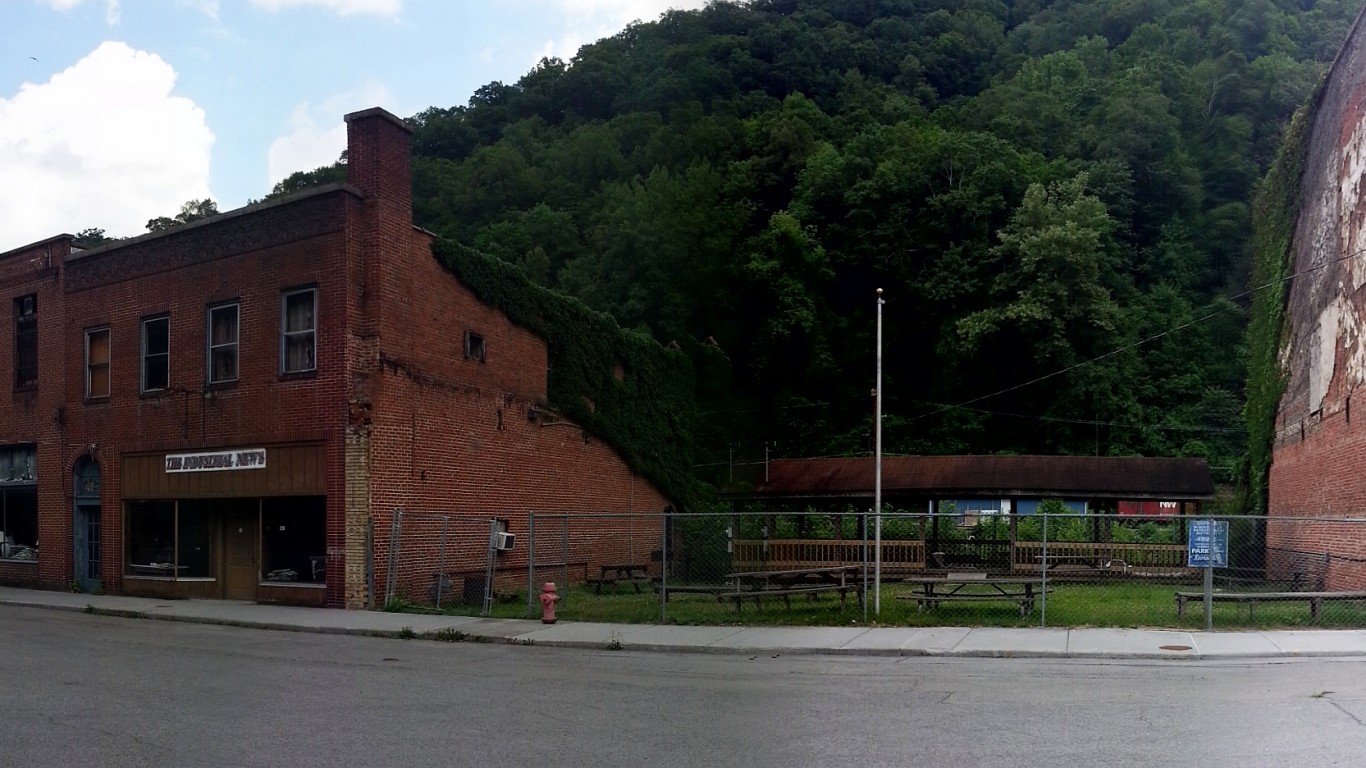
19. Iaeger, West Virginia
> Total characters: 6
> Total vowels: 4
> Population: 307
Take a trip to Iaeger (“YAY-ger”) and you might be lucky enough to run into one of the 302 people who live there. Named for Col. William G. W. Iaeger, this town has had some easier-to-pronounce names over the years, including “WIlliamsburg” and “Forks on the River.”
[in-text-ad-2]
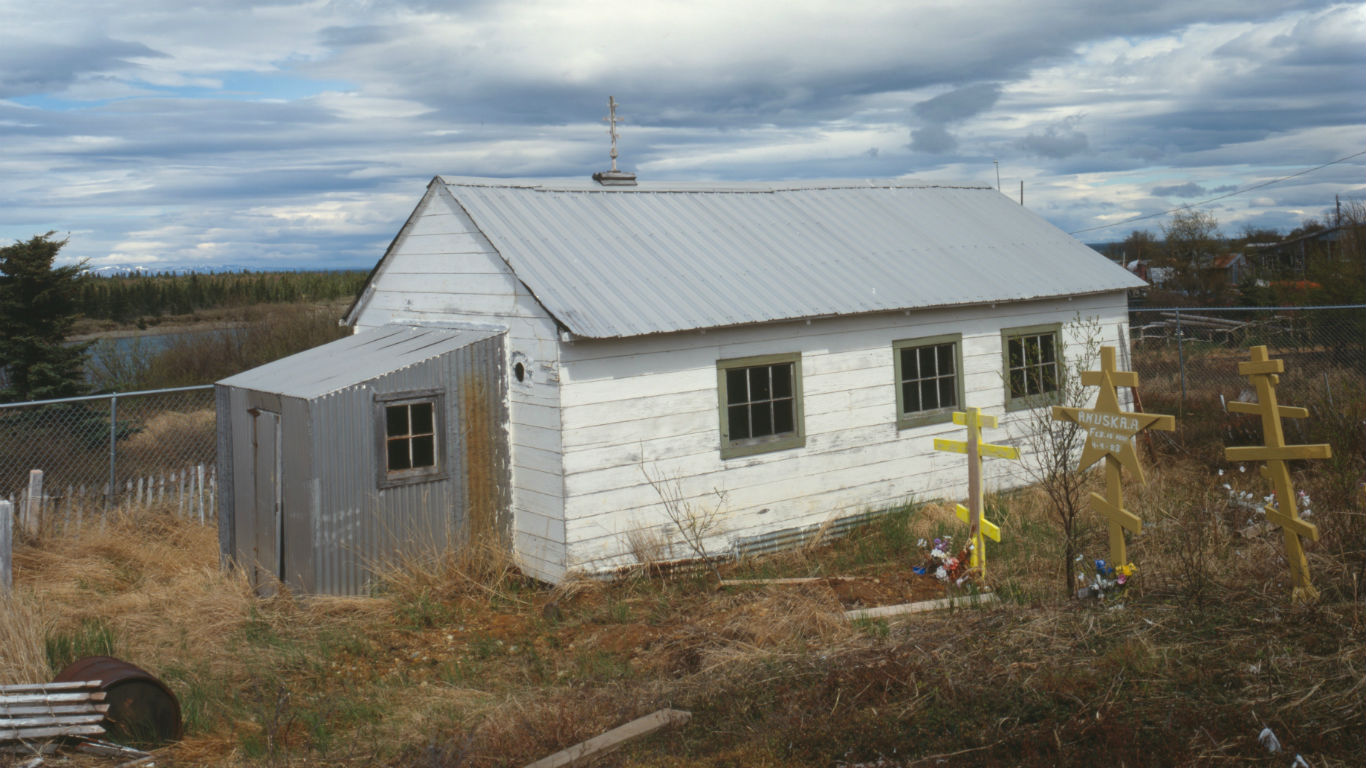
20. Igiugig, Alaska
> Total characters: 7
> Total vowels: 4
> Population: 46
Igiugig is a tiny village with a population of only 69, consisting mainly of Yupik Eskimos, Aleuts, and Athabascan people. According to the Department of Community and Economic Development, it’s pronounced “ig-ee-UH-gig.”
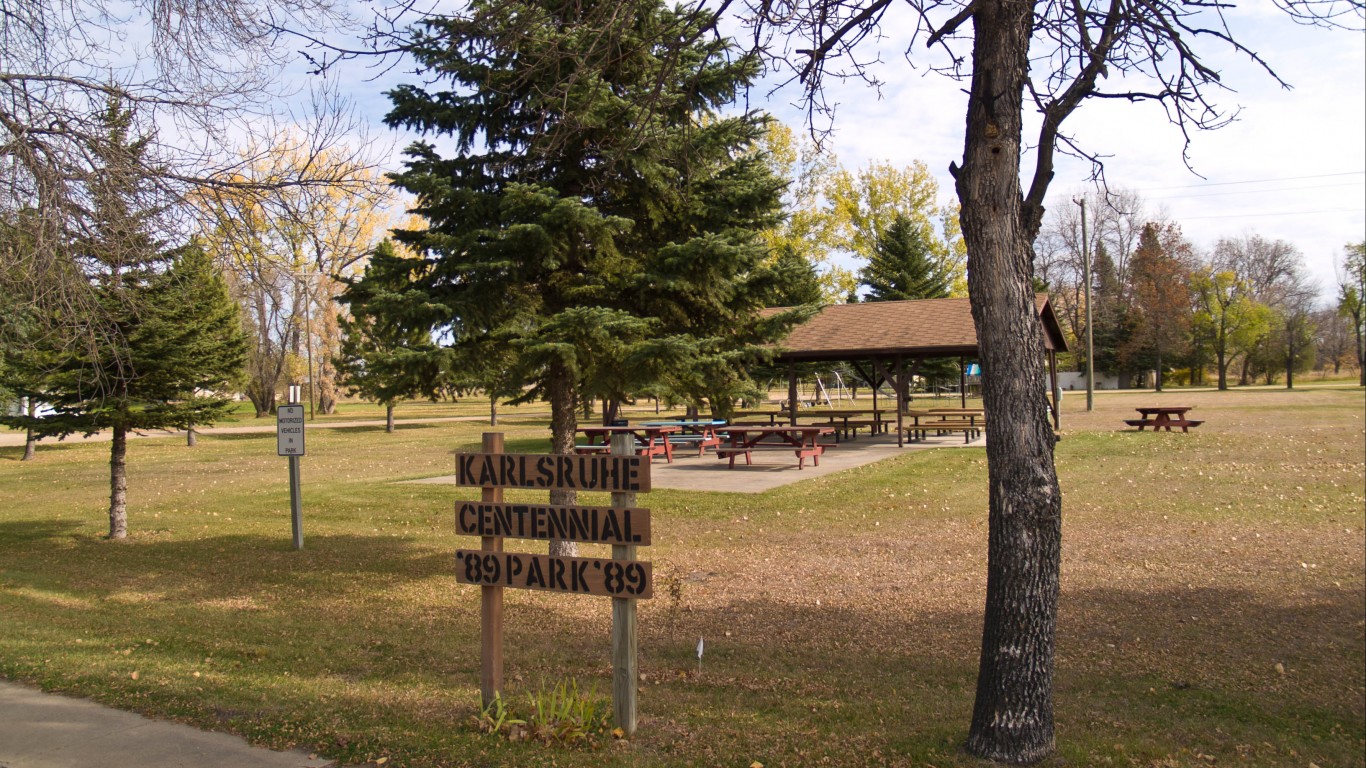
21. Karlsruhe, North Dakota
> Total characters: 9
> Total vowels: 3
> Population: 71
Karlsruhe is one of the smallest towns on our list, with a population of less than a hundred. (Its German namesake is thousands of times bigger.) In North Dakota, it’s pronounced “karls-ROO.”
[in-text-ad]
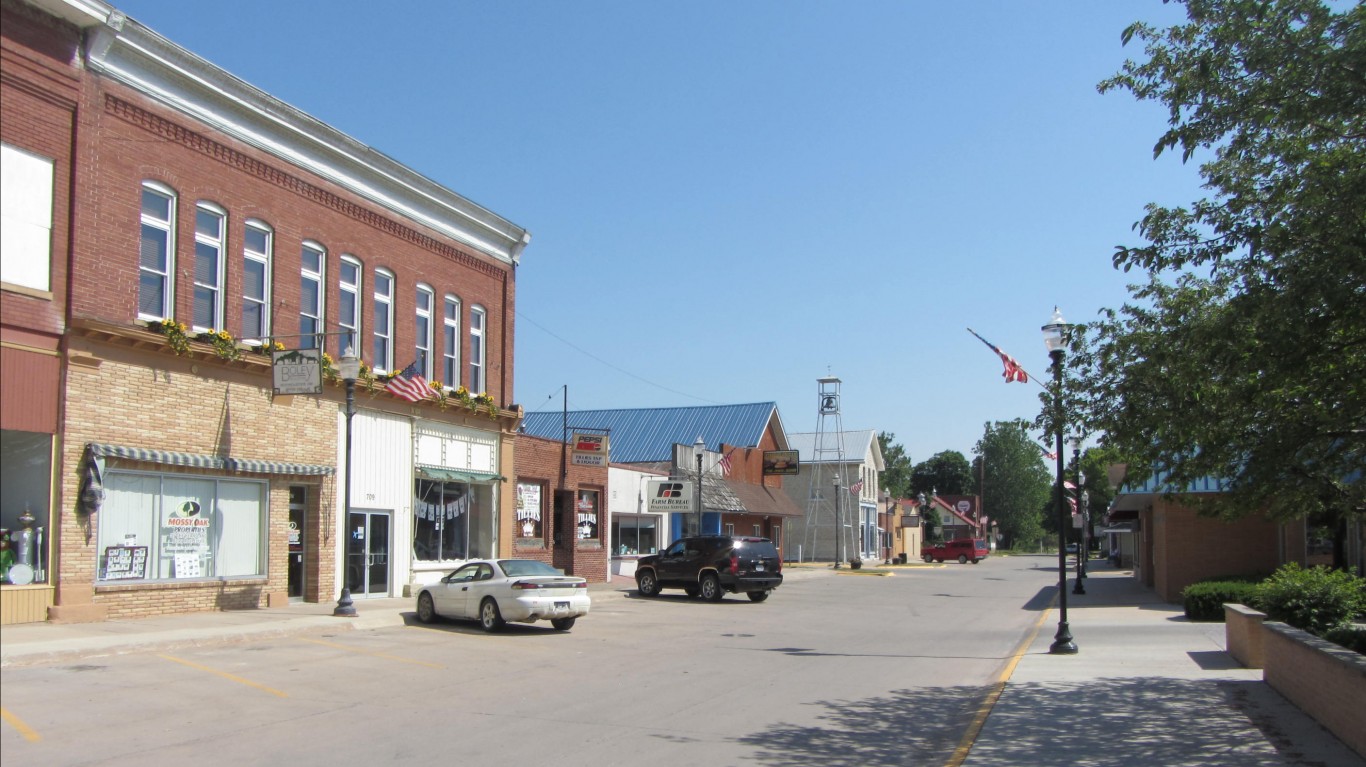
22. Keosauqua, Iowa
> Total characters: 9
> Total vowels: 6
> Population: 916
Keosauqua (“KEE-o-SAW-qua”) is the Native American word for “Big Bend.” The town indeed lies on the bend of the Des Moines River. The town’s website boasts that there is “virtually no crime (and literally not a traffic light in town)”!
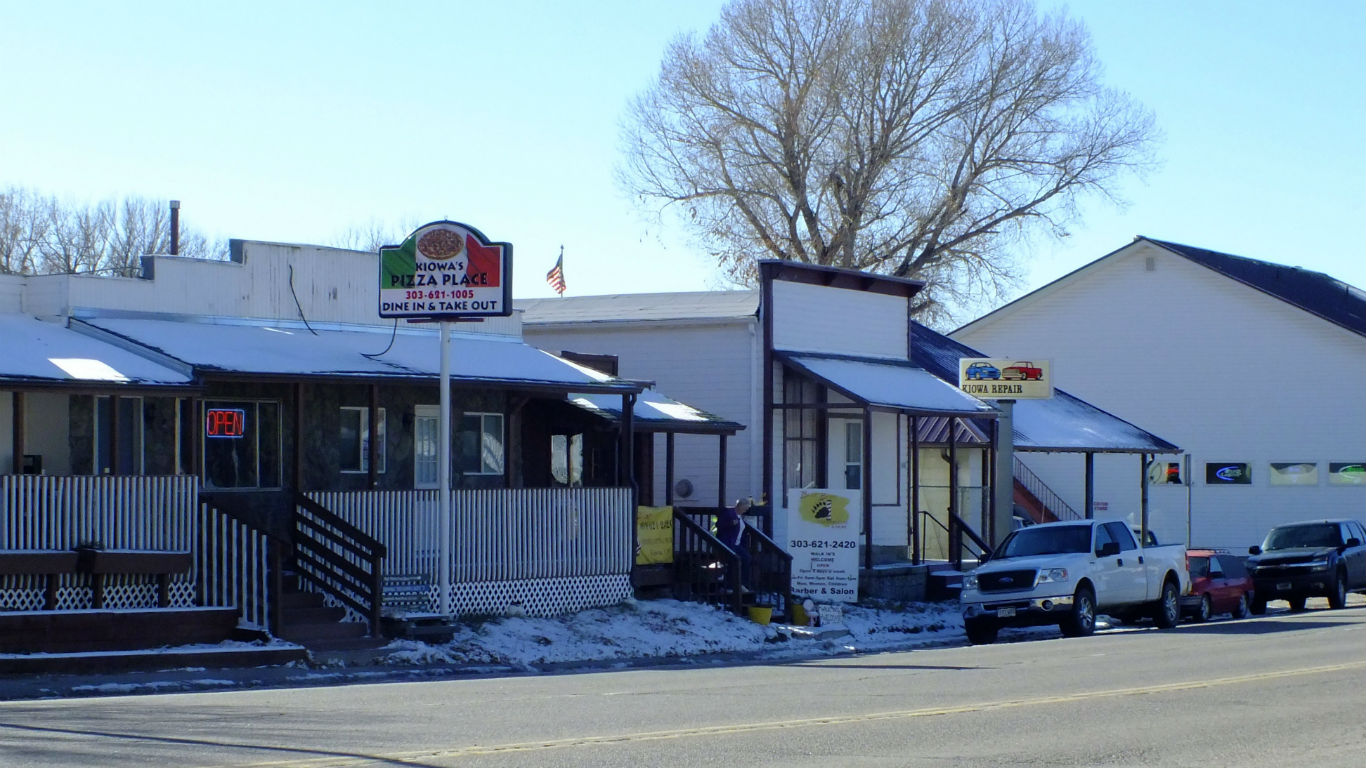
23. Kiowa, Colorado
> Total characters: 5
> Total vowels: 3
> Population: 797
Kiowa (pronounced like “Iowa” with a K) is a small town southeast of Denver. The town is named for the Native American people who lived in the region.
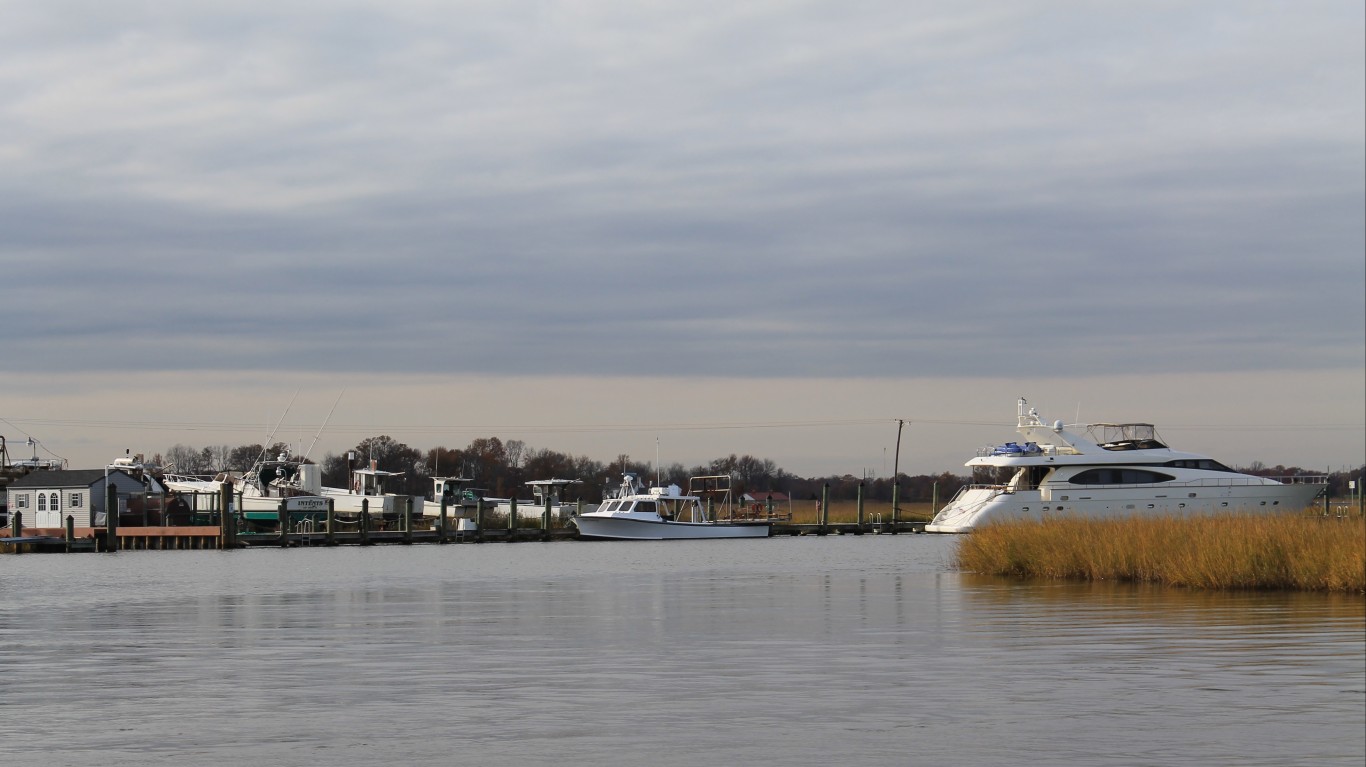
24. Leipsic, Delaware
> Total characters: 7
> Total vowels: 3
> Population: 129
Leipsic (“LIP-sick”) is named for the German city of Leipzig (pronounced LYPE-zick). Situated on the banks of the Leipsic River, the town is known for its delicious oysters and crabs.
[in-text-ad-2]
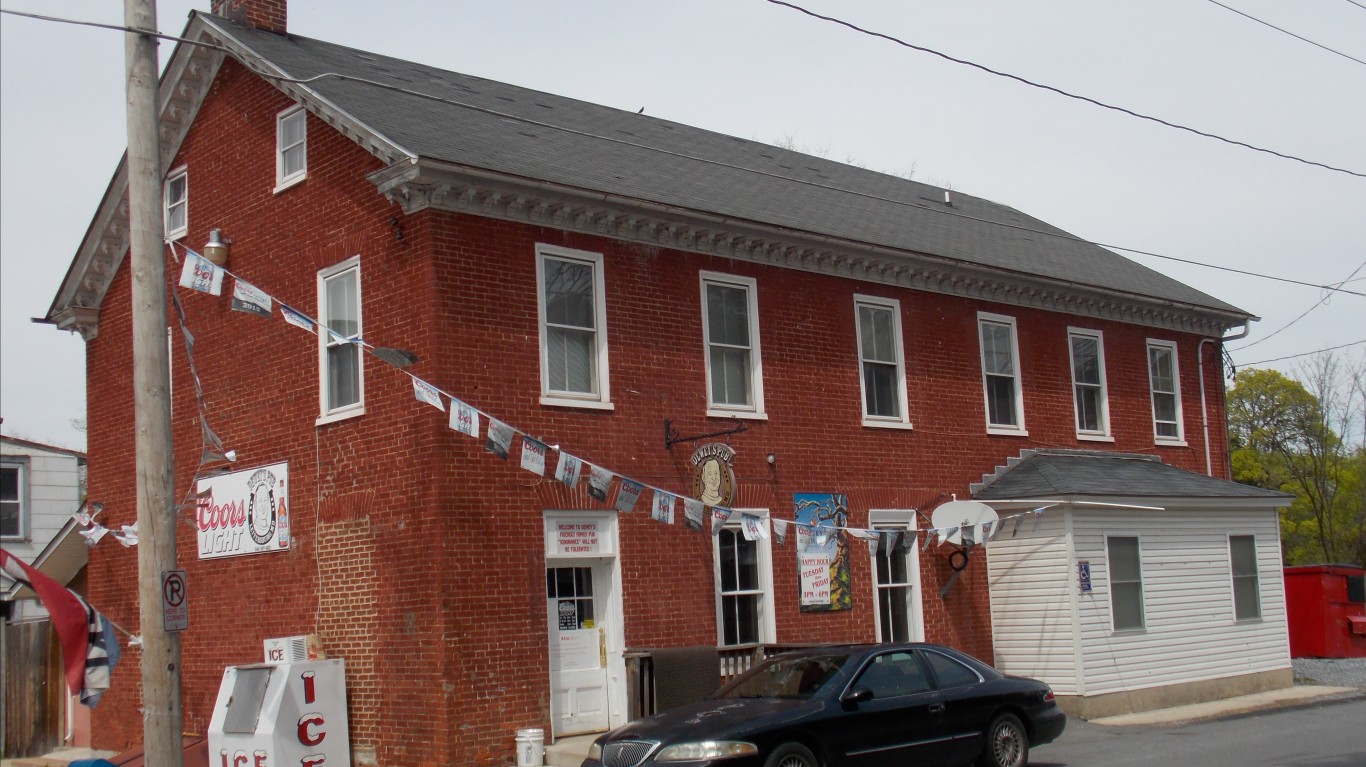
25. Leitersburg, Maryland
> Total characters: 11
> Total vowels: 4
> Population: 520
Leitersburg is pronounced like “lighters burg.” The early settlers in the area were almost exclusively German and used German pronunciation.
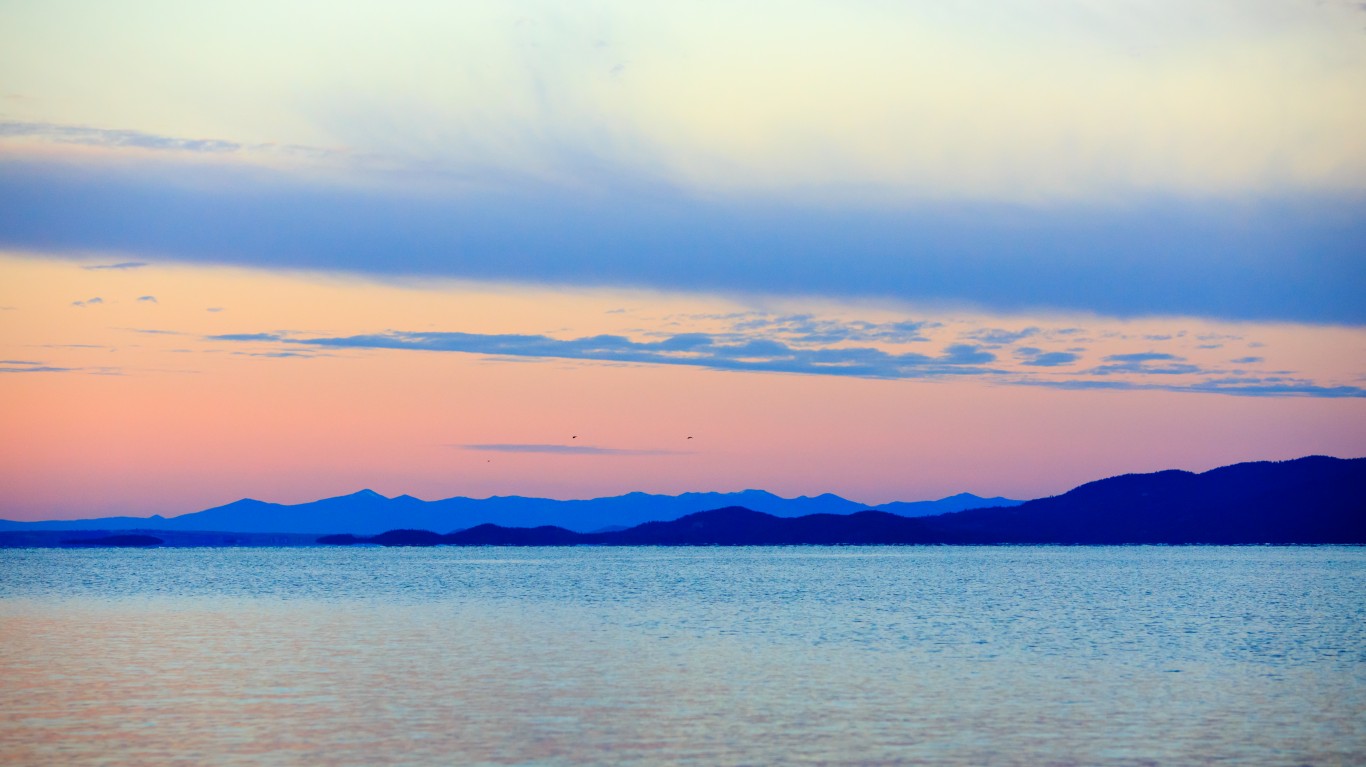
26. Lindisfarne, Montana
> Total characters: 11
> Total vowels: 4
> Population: 165
Lindisfarne (“LIN-dis-FARN”) is located on Flathead Lake near the Flathead Reservation and Glacier National Park. The town is named after Holy Island of Lindisfarne, a tidal island in England.
[in-text-ad]
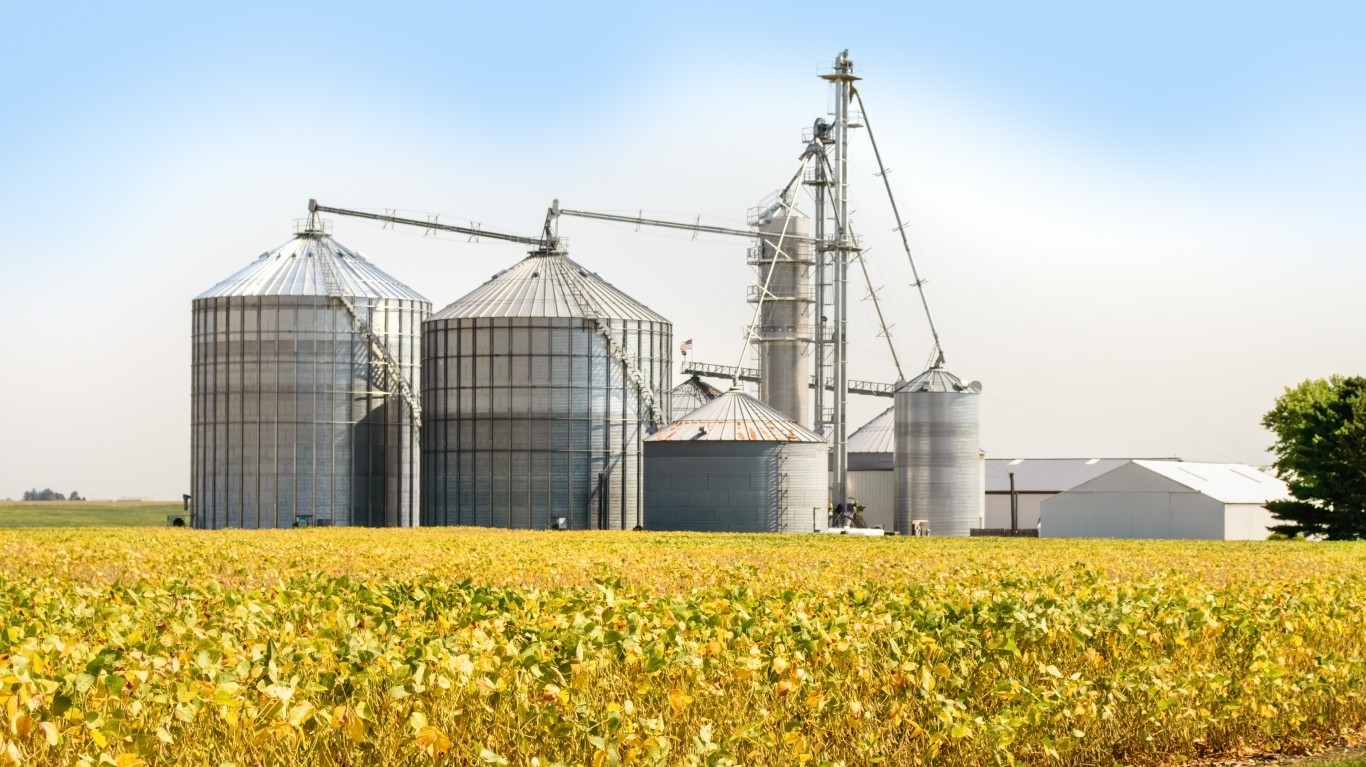
27. Moweaqua, Illinois
> Total characters: 8
> Total vowels: 5
> Population: 1,854
A farming community in the middle of the state, Moweaqua (“moh-WEEK-wuh’) is known for its corn and soybean production.
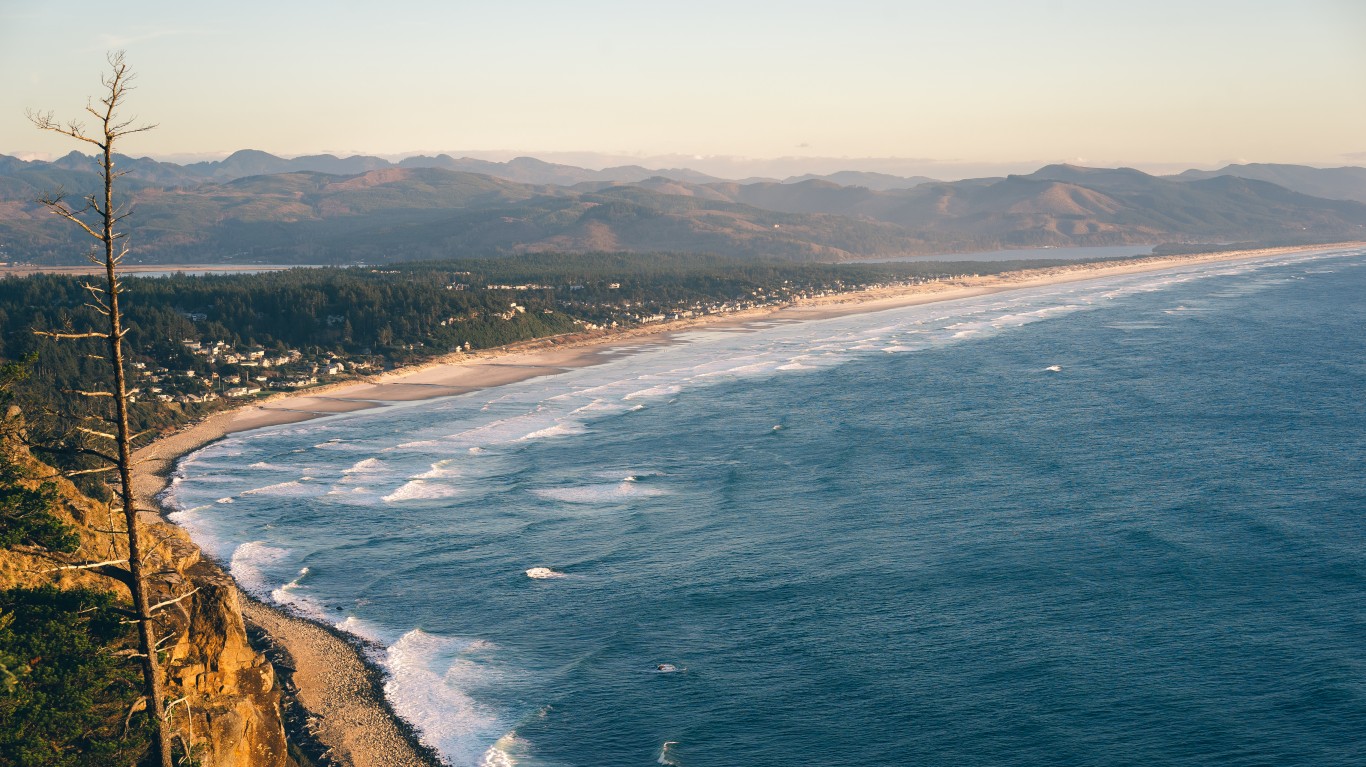
28. Neahkahnie, Oregon
> Total characters: 10
> Total vowels: 5
> Population: 72
Neahkahnie (“NEE-uh-kah-nee”) is a small town located along the Oregon Coast, at the foot of Neahkahnie Mountain. Legend has it that Spanish sailors buried a treasure in the mountain in the 16th century.
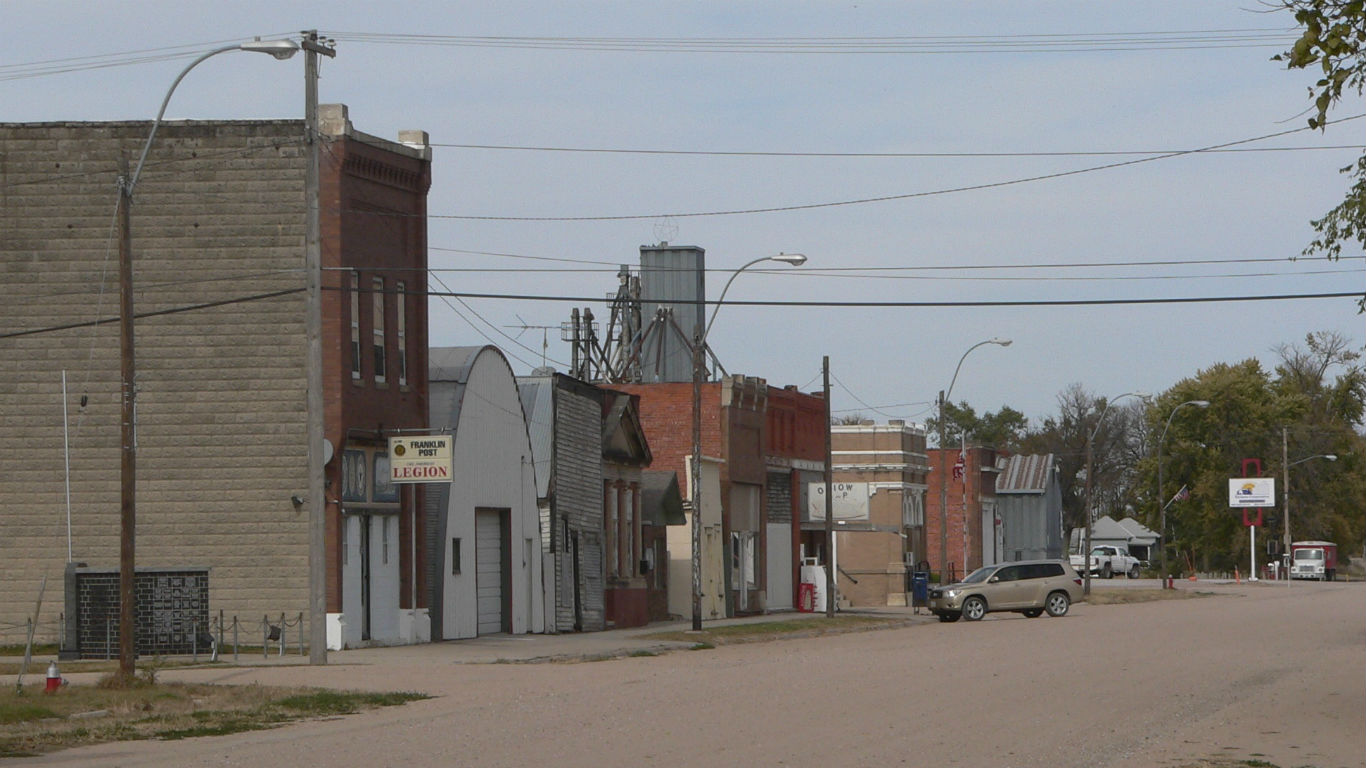
29. Ohiowa, Nebraska
> Total characters: 6
> Total vowels: 4
> Population: 164
Ohiowa is pronounced like Ohio with a “wa” added. When the town was established, settlers from Ohio wanted to name it after their state, while those from Iowa preferred theirs. The dispute was settled by combining the two state names.
[in-text-ad-2]
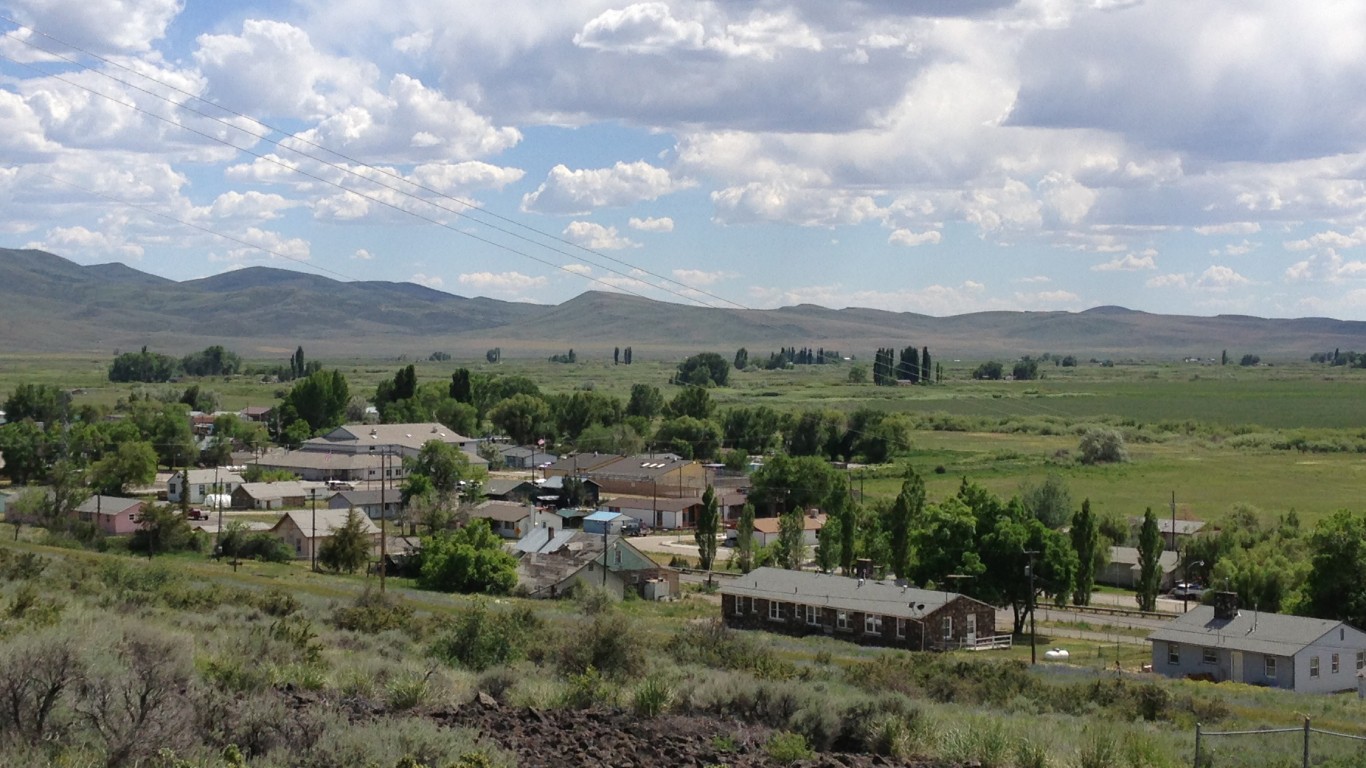
30. Owyhee, Nevada
> Total characters: 6
> Total vowels: 4
> Population: 1,104
This is another town name with an odd history — it’s an anglicization of Hawai’i and is pronounced the same way.
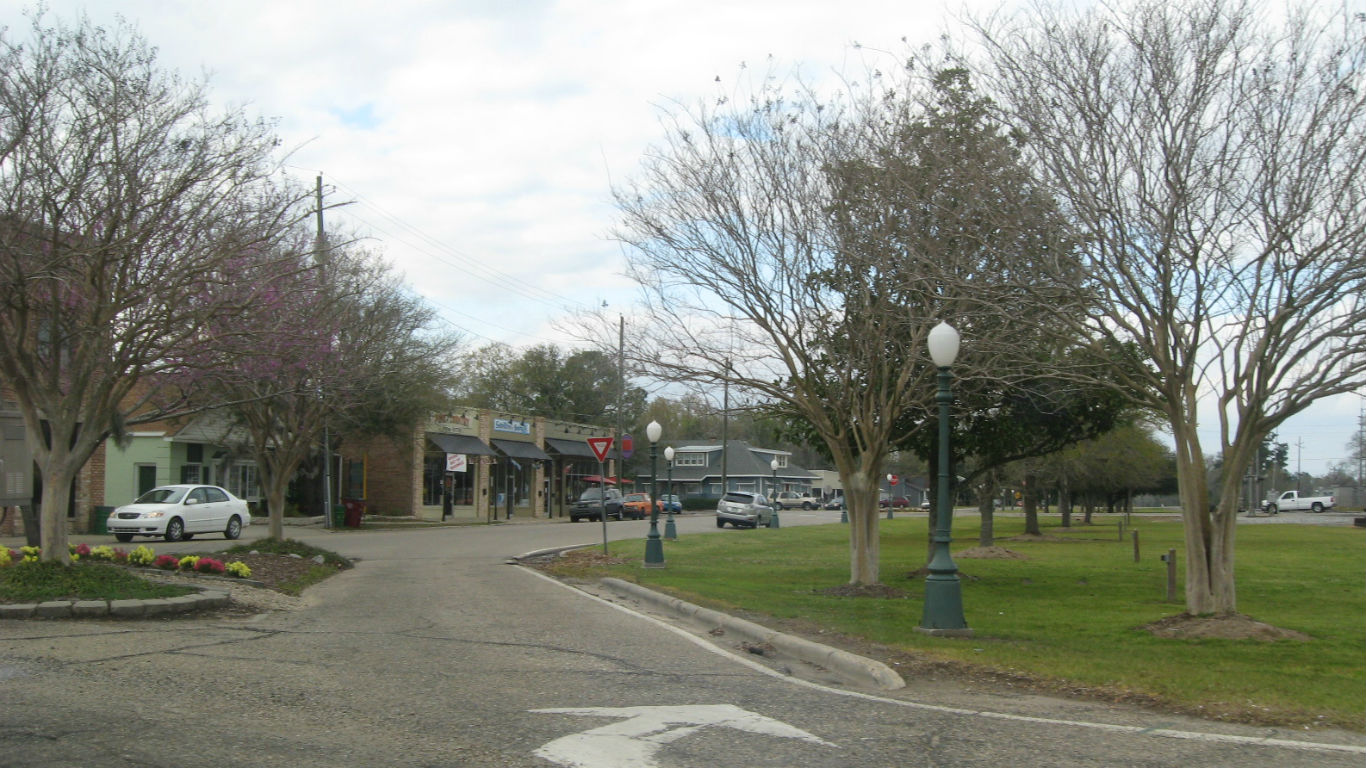
31. Picayune, Mississippi
> Total characters: 8
> Total vowels: 5
> Population: 10,528
This town has an unusual history — it was named after the Times-Picayune in New Orleans, which the founder liked. It derives from a Spanish coin and is pronounced “pi-kuh-yoon.”
[in-text-ad]
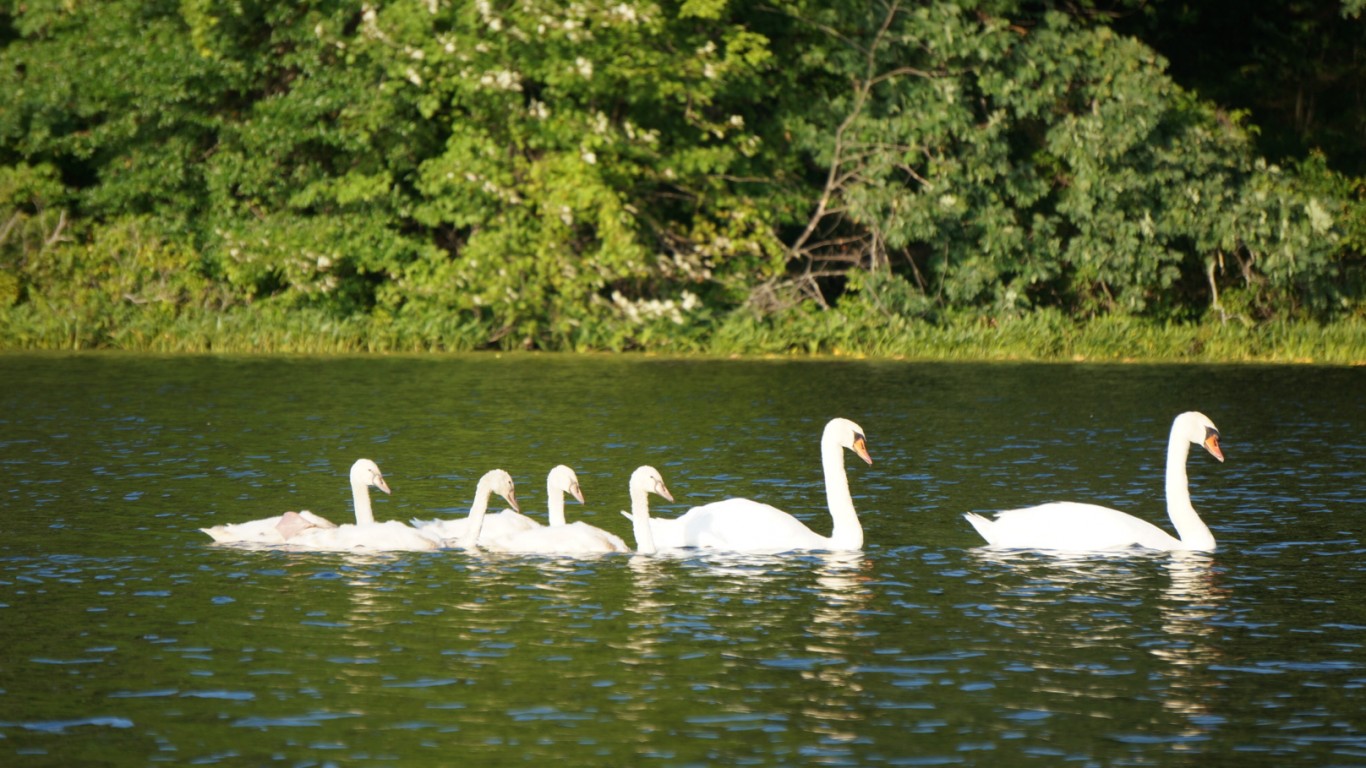
32. Ponshewaing, Michigan
> Total characters: 11
> Total vowels: 4
> Population: 38
Ponshewaing (PON-she-wang) was a railroad stop before it was a town. Some say it means “peaceful waters,” others say “winter home.”
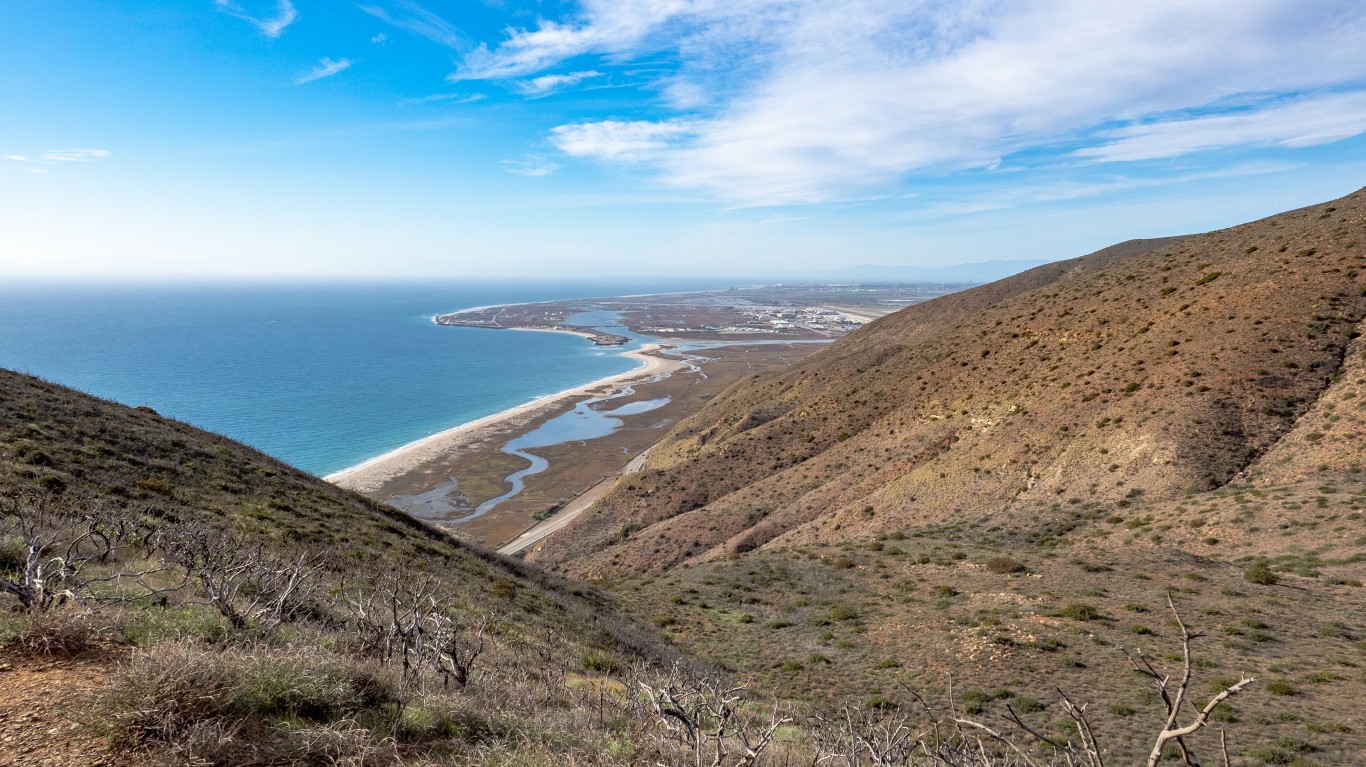
33. Port Hueneme, California
> Total characters: 7
> Total vowels: 5
> Population: 22,262
Port Hueneme (“wy-nee-mee”) is a seaside community in Ventura County. The name derives from a Chumash word (“wene’mu”) meaning “resting place.”
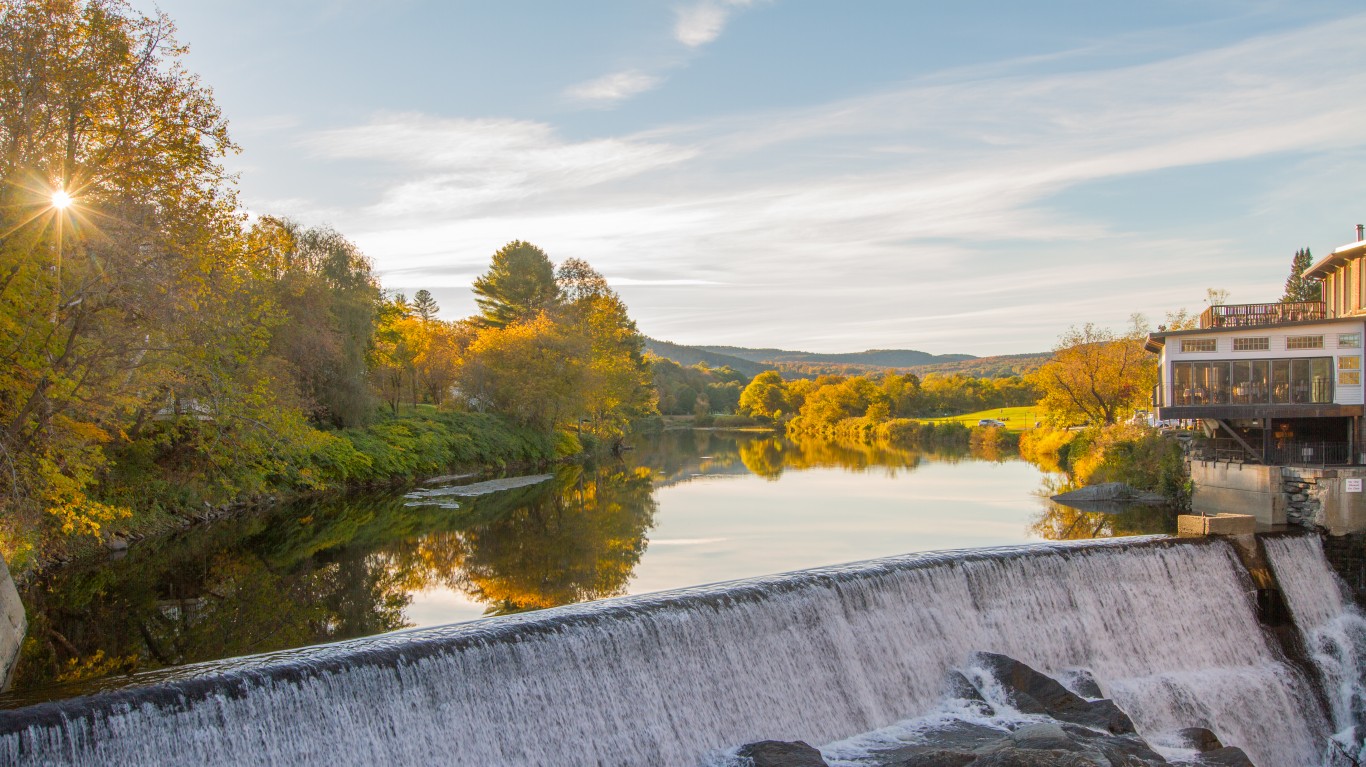
34. Quechee, Vermont
> Total characters: 7
> Total vowels: 4
> Population: 339
There isn’t just a town called Quechee (“kwee-chee”) in Vermont, there’s also Quechee State Park and the Quechee Gorge, and the equally hard-to-pronounce Ottauquechee River.
[in-text-ad-2]
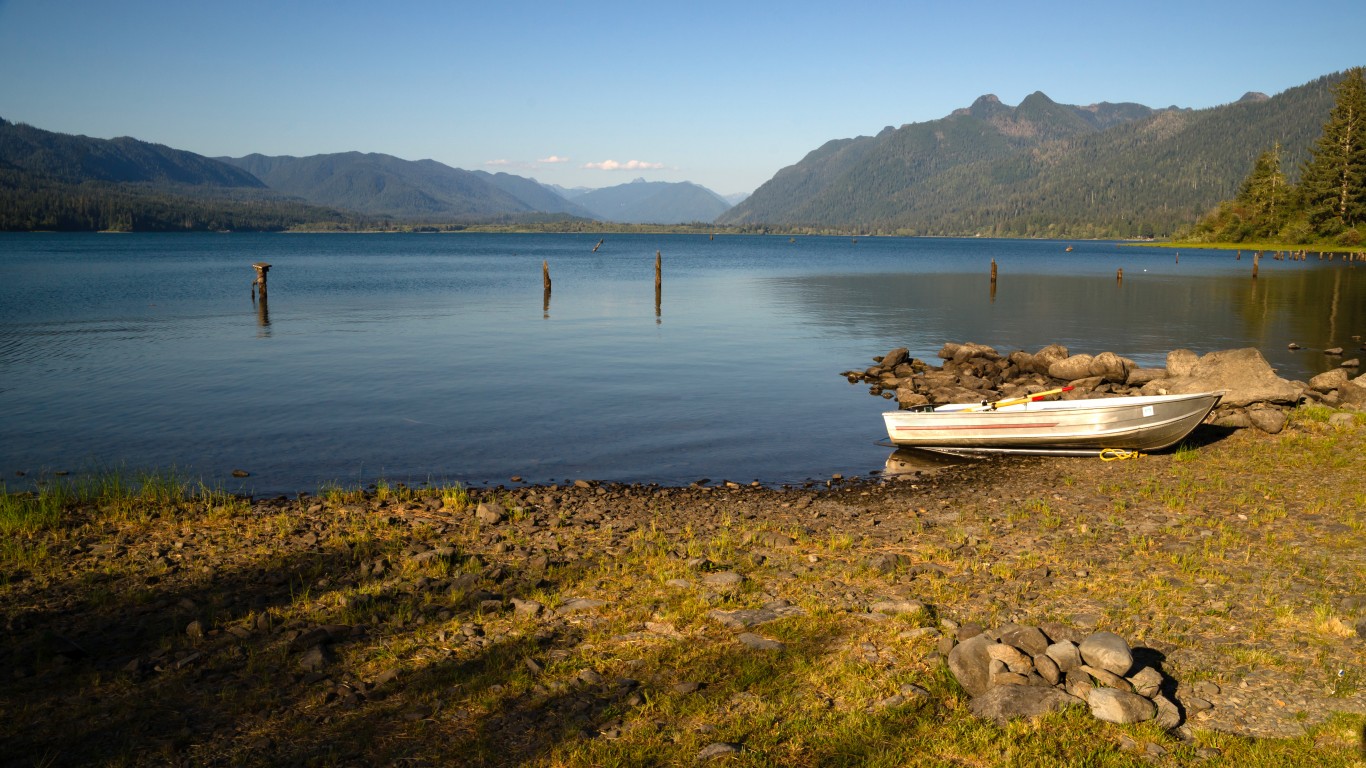
36. Qui-nai-elt Village, Washington
> Total characters: 16
> Total vowels: 8
> Population: 79
Qui-nai-elt is a variation of Quinault and is pronounced “kwi-nail.” The town in the southeastern part of the Quinault Indian Nation.
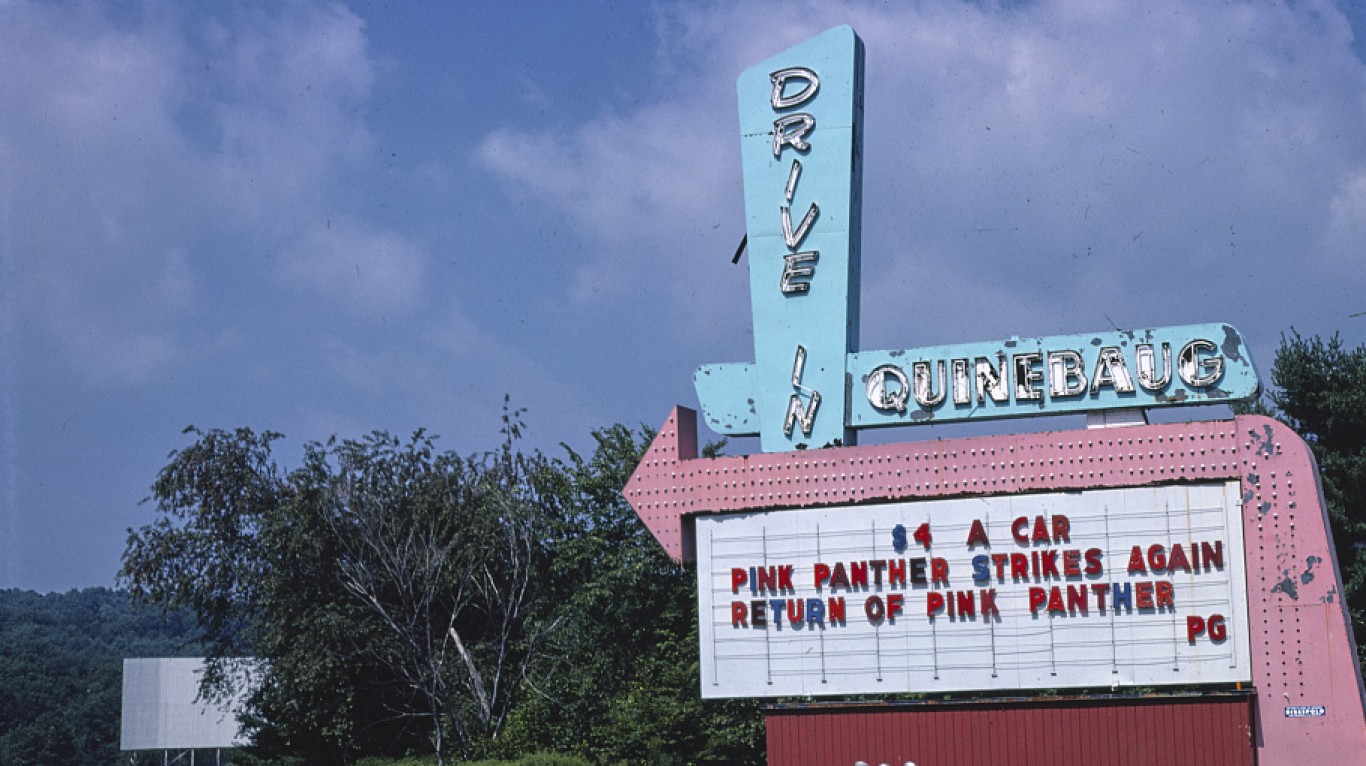
37. Quinebaug, Connecticut
> Total characters: 9
> Total vowels: 5
> Population: 1,545
Quinebaug (“quinn-a-bog”) is a town in northeastern Connecticut. The name comes from a southern New England Native American term meaning “long pond.”
[in-text-ad]
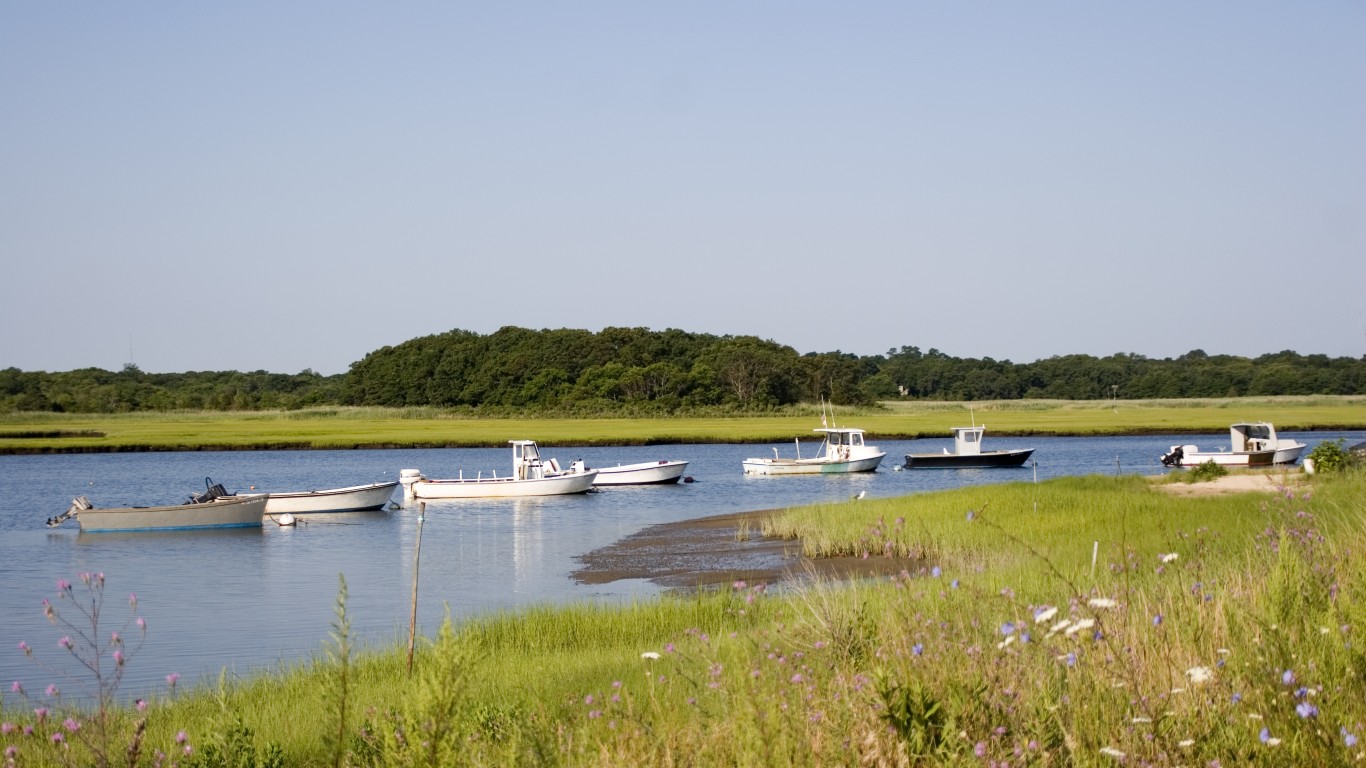
38. Quiogue, New York
> Total characters: 7
> Total vowels: 5
> Population: 728
Quiogue is pronounced “kwi-og.” The first syllable rhymes with “why,” and the second rhymes with “bog.” To complicate things, it’s next to Quogue, which is simply pronounced “kwog.”
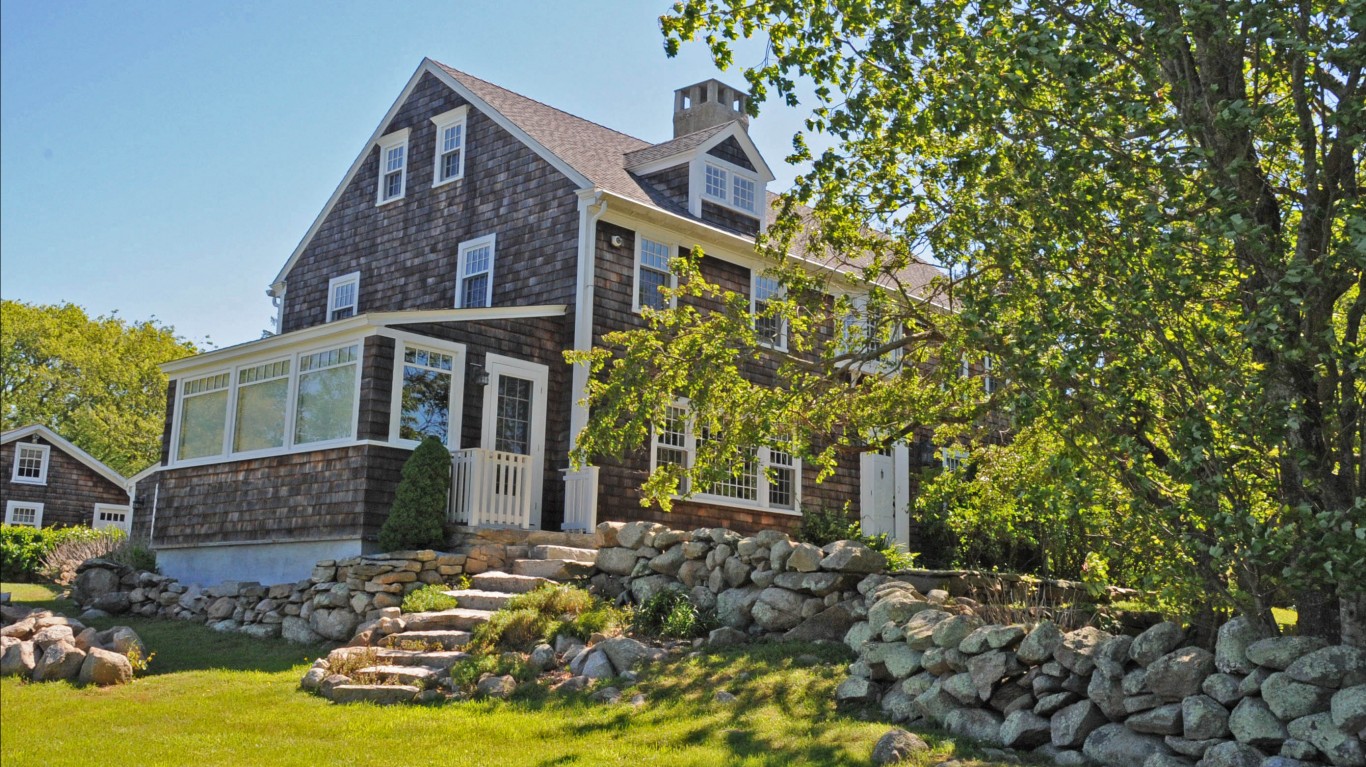
39. Quonochontaug, Rhode Island
> Total characters: 13
> Total vowels: 6
> Population: 606
Quonochontaug, which means black fish, is pronounced “KWAHN-ah-kahn-tawg,” although even locals have difficulty with it. Rhode Island has many hard-to-pronounce names, legacies of five Indian tribes that lived there: the Narragansetts, Niantics, Nipmucks, Pequots, and Wampanoags.
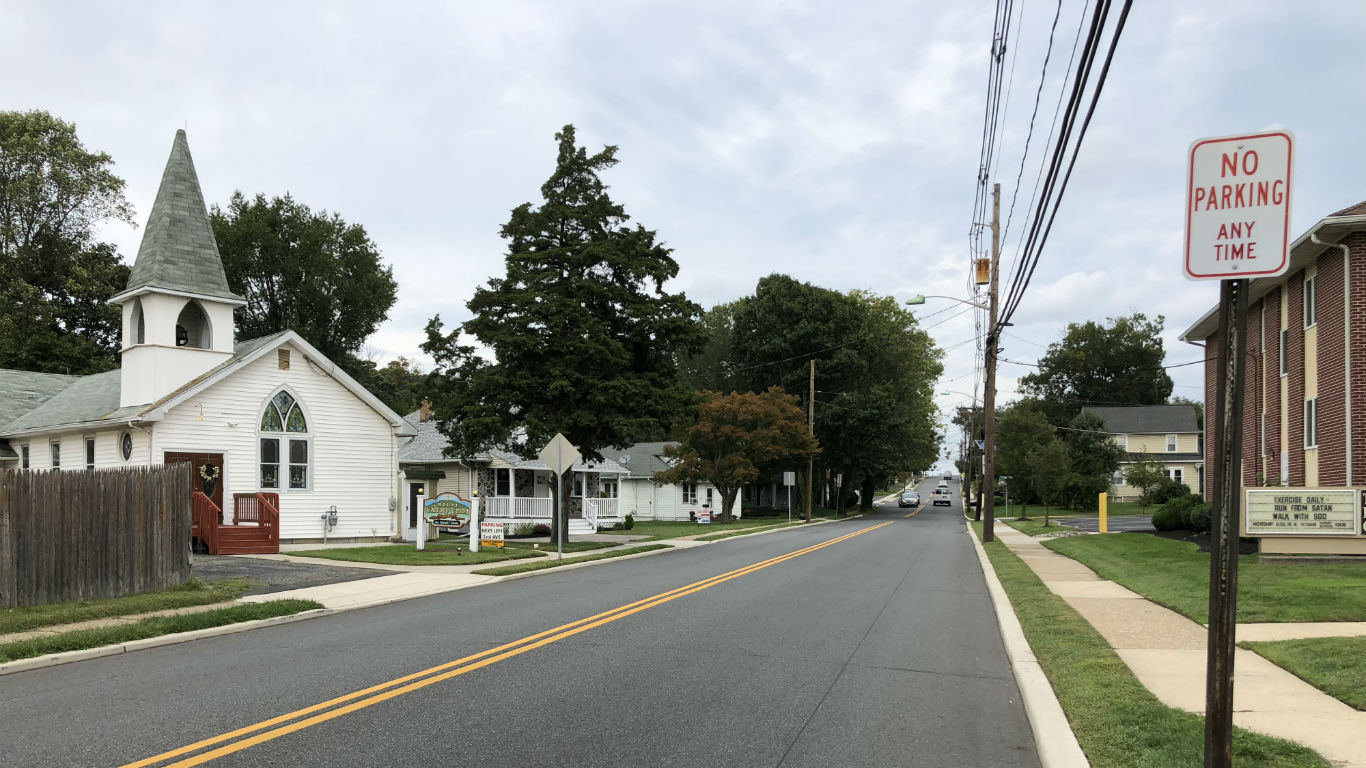
40. Runnemede, New Jersey
> Total characters: 9
> Total vowels: 4
> Population: 8,391
Runnemede (pronounced “RUN-a-meade”) was most likely named after Runnymede in England, though there is a story, most likely apocryphal, that the name comes from the chant at a local tavern for: “Rum we need!”
[in-text-ad-2]
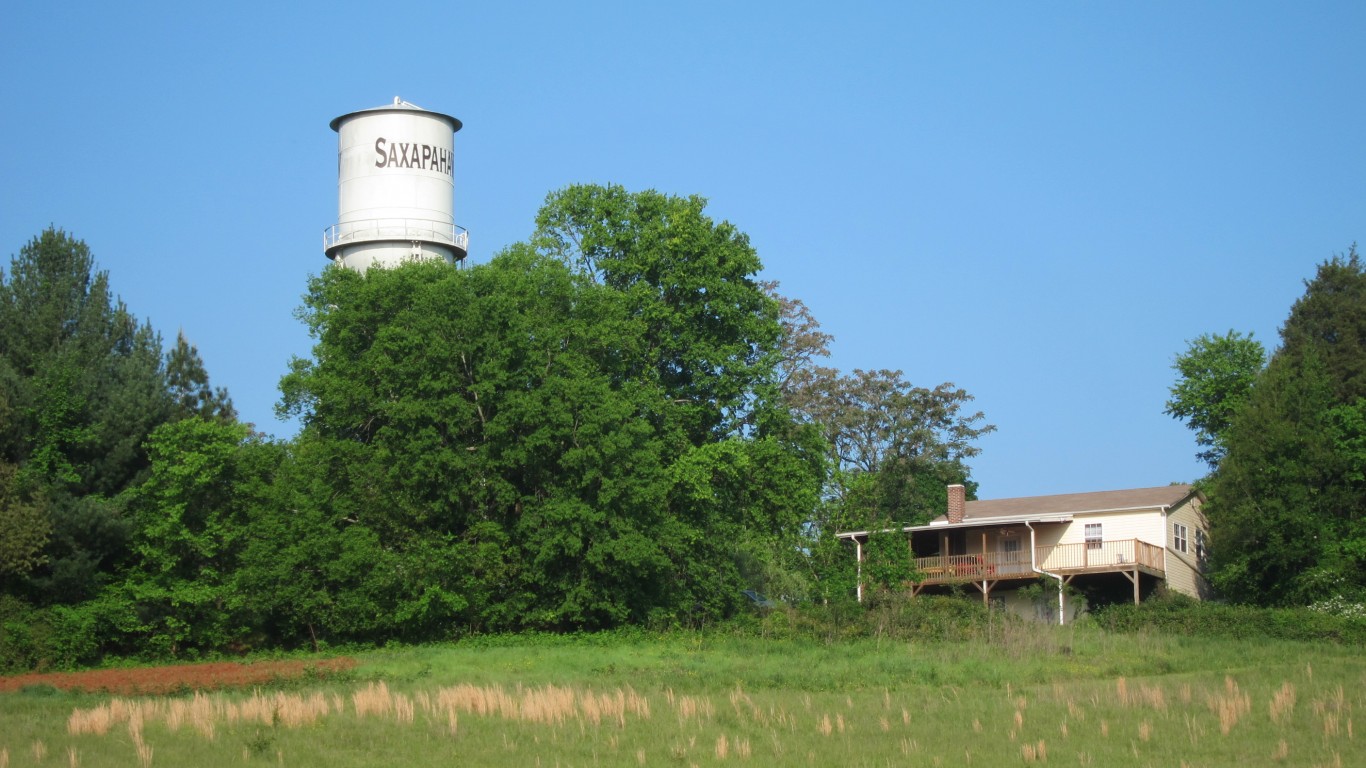
41. Saxapahaw, North Carolina
> Total characters: 9
> Total vowels: 4
> Population: 1,370
Saxapahaw is named for the Sissipahaw tribe and is pronounced “sax-uh-puh-haw” (although some locals shorten it to “sax-p’haw”).
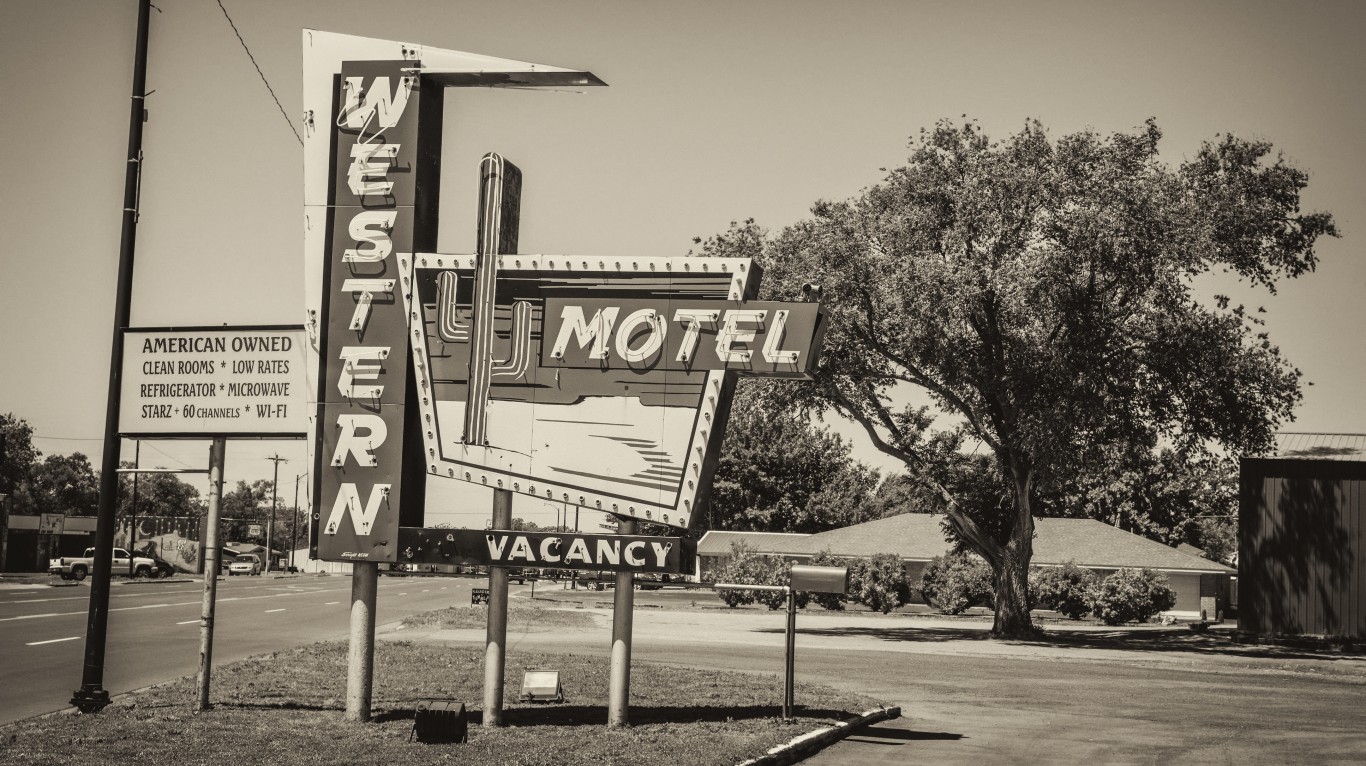
42. Sayre, Oklahoma
> Total characters: 5
> Total vowels: 3
> Population: 4,625
Sayre isn’t too much of a challenge — you flip the final letters and say “say-er.”
[in-text-ad]
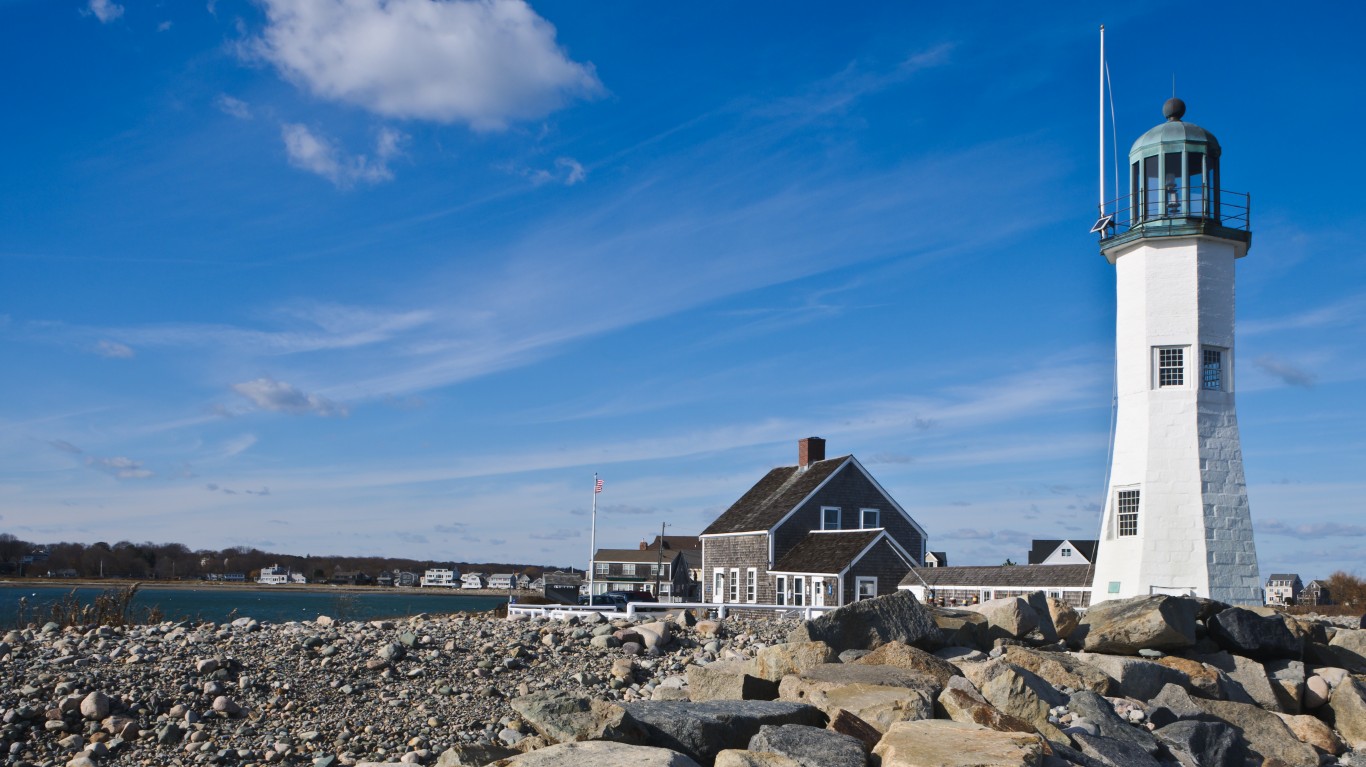
43. Scituate, Massachusetts
> Total characters: 8
> Total vowels: 4
> Population: 5,749
Scituate (“sit-choo-it”) derives from an Indian word, which the early settlers understood as satuit, meaning “cold brook.” It’s situated just south of Boston.
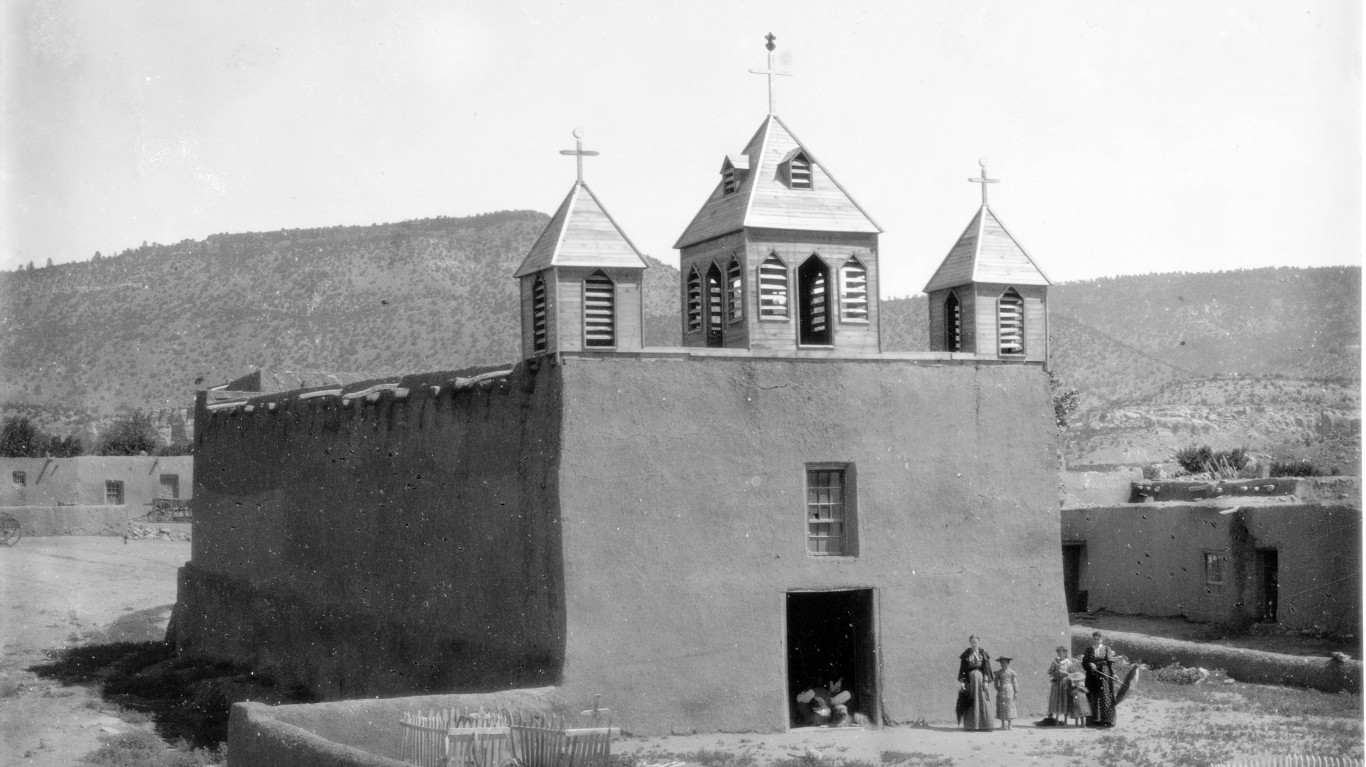
44. Seboyeta, New Mexico
> Total characters: 8
> Total vowels: 5
> Population: 47
Seboyeta is a variation on the Spanish word cebolleta, which means spring onion or scallion and is pronounced “seb-oh-YET-oh.”
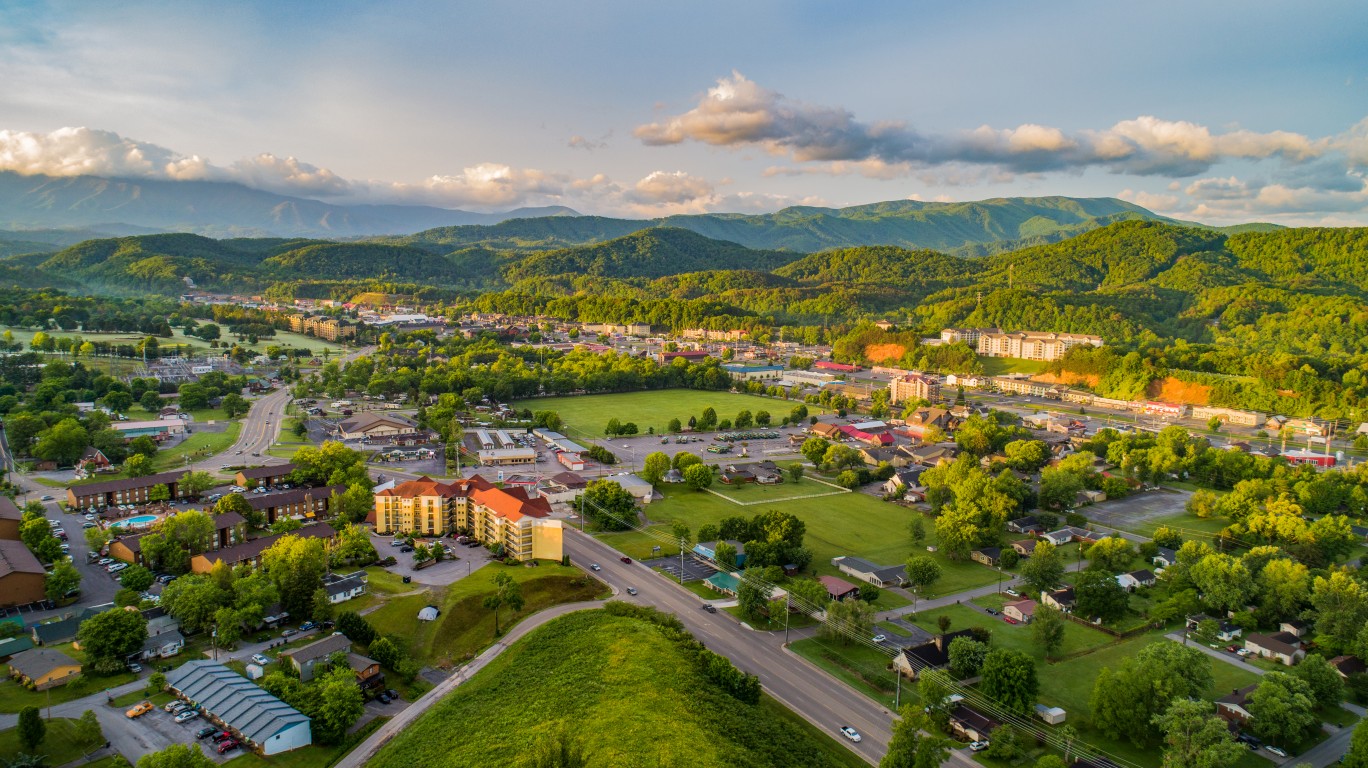
45. Sevierville, Tennessee
> Total characters: 11
> Total vowels: 5
> Population: 16,387
Sevierville is pronounced like “severe-ville.” It’s named after Gen. John Sevier, first governor of the state of Tennessee. Sevier was originally the French name “Xavier.”
[in-text-ad-2]
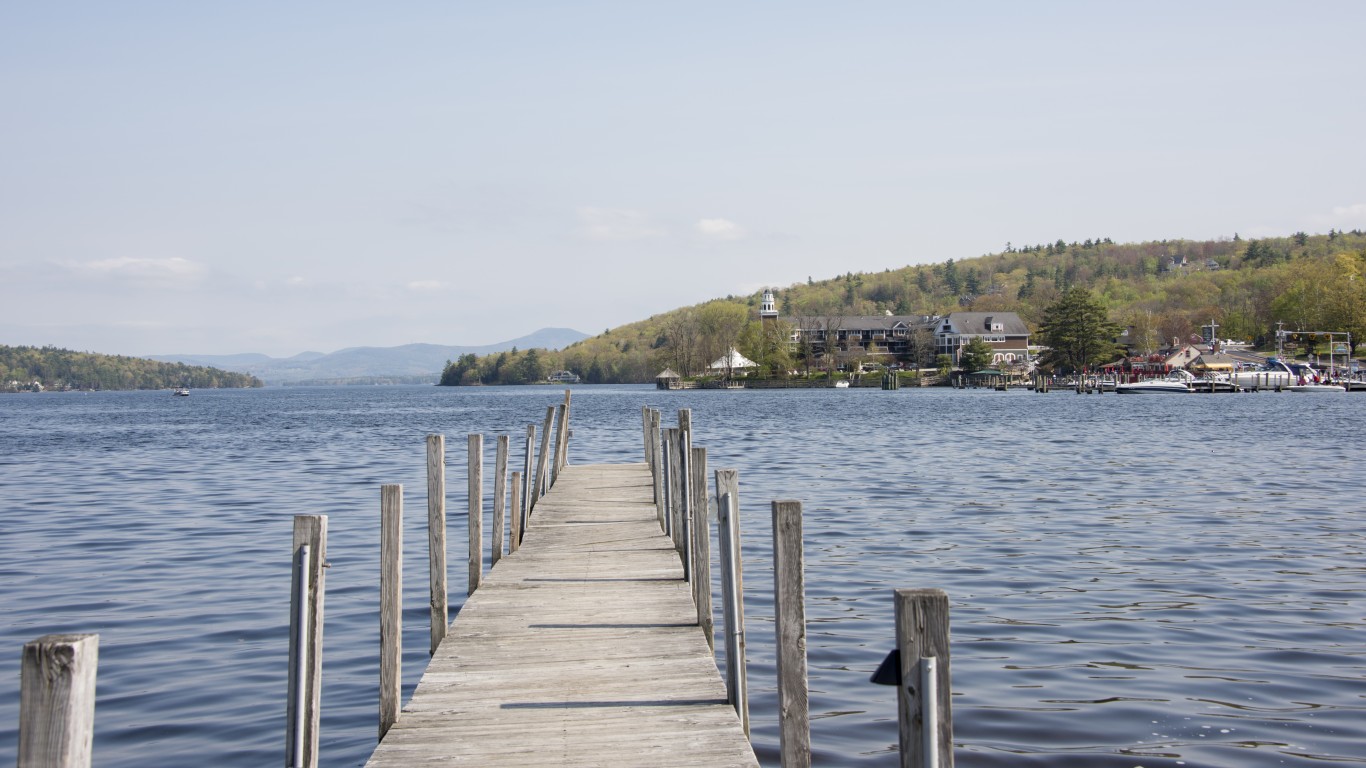
46. Suissevale, New Hampshire
> Total characters: 10
> Total vowels: 5
> Population: 205
Suissevale, pronounced “Swiss vale,” is on Lake Winnipesaukee, which deserves its own place on our list.
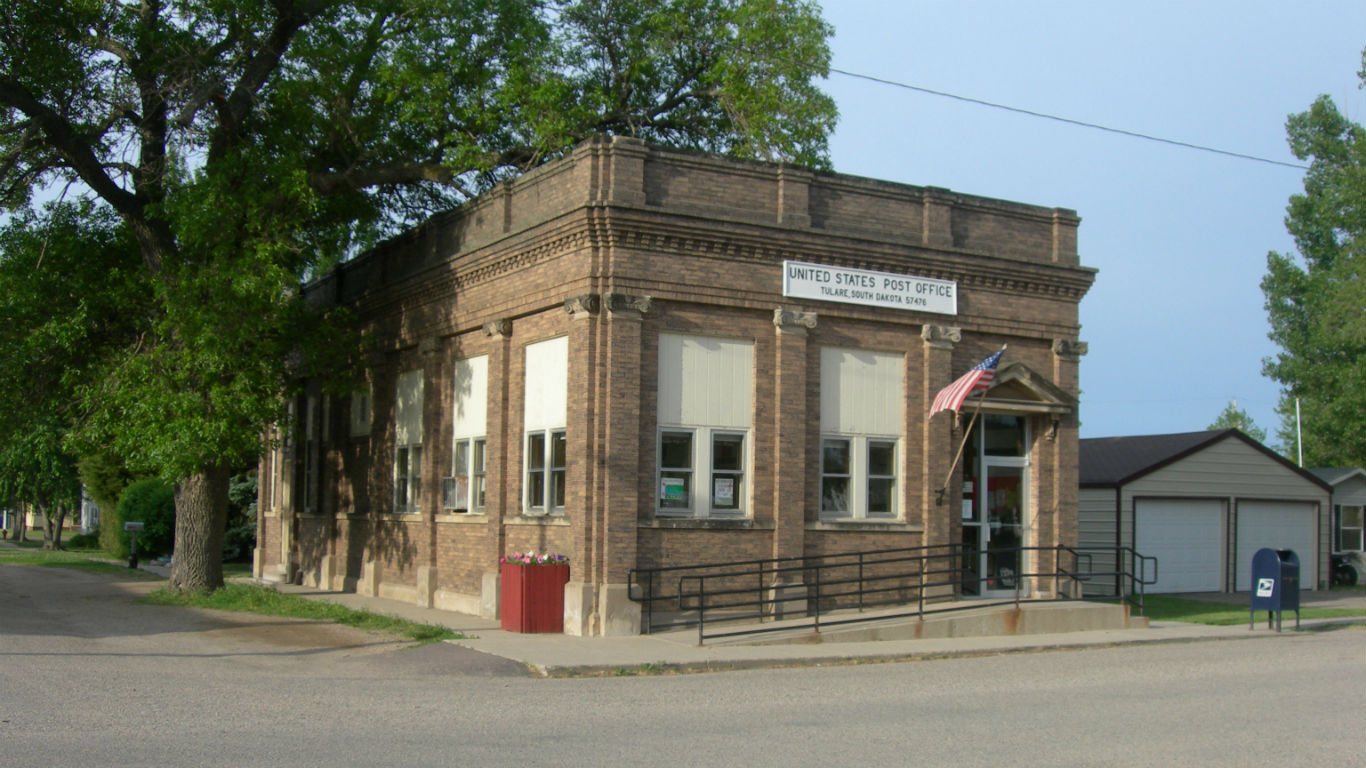
47. Tulare, South Dakota
> Total characters: 6
> Total vowels: 3
> Population: 256
Tulare (“too-LAYR”) is in Spink County, South Dakota. This name derives from the Classical Nahuatl (a language spoken by the Aztec) word “tōllin” (“sedge” or “reeds”), by way of Spanish.
[in-text-ad]
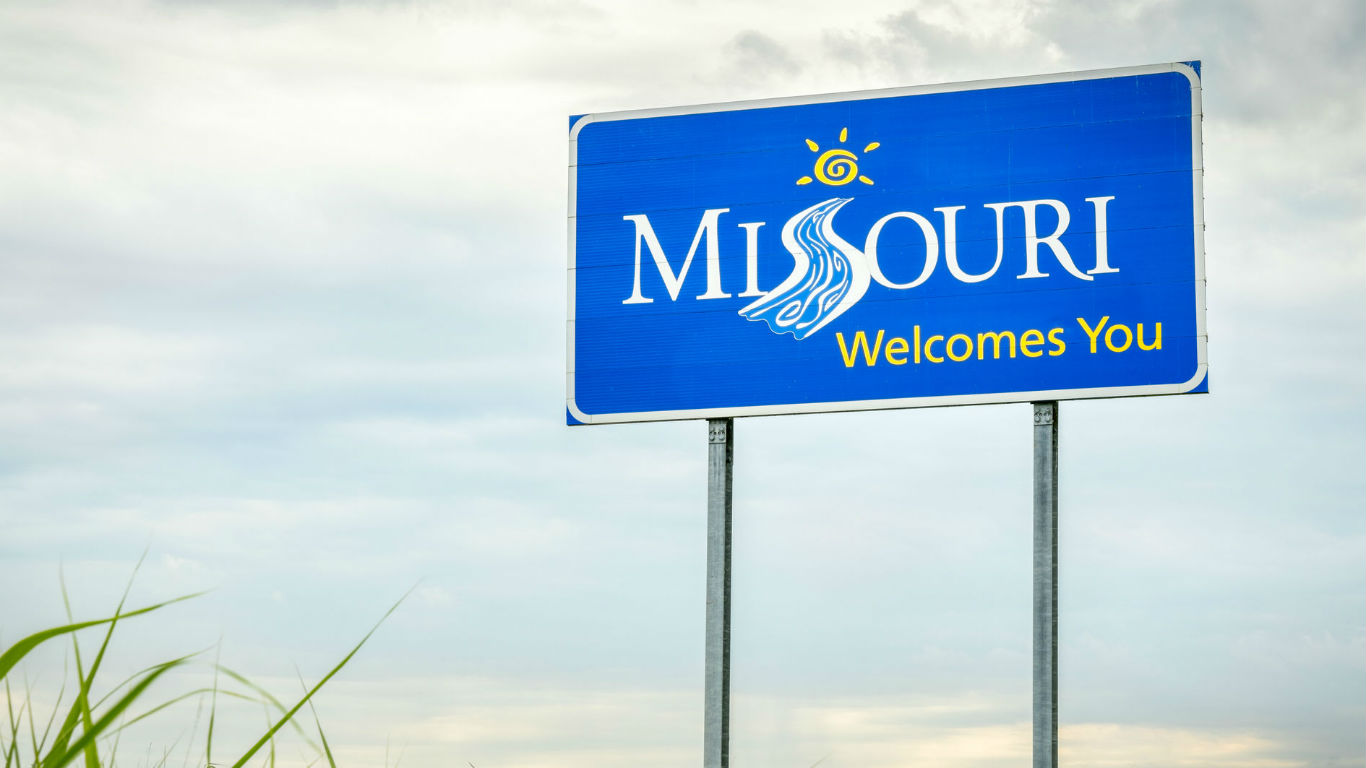
45. Weaubleau, Missouri
> Total characters: 9
> Total vowels: 6
> Population: 545
This is pronounced “WAH-bloh,” according to a Missouri pronunciation guide, although some maintain it is “we-bah-low” or “we-blow.”
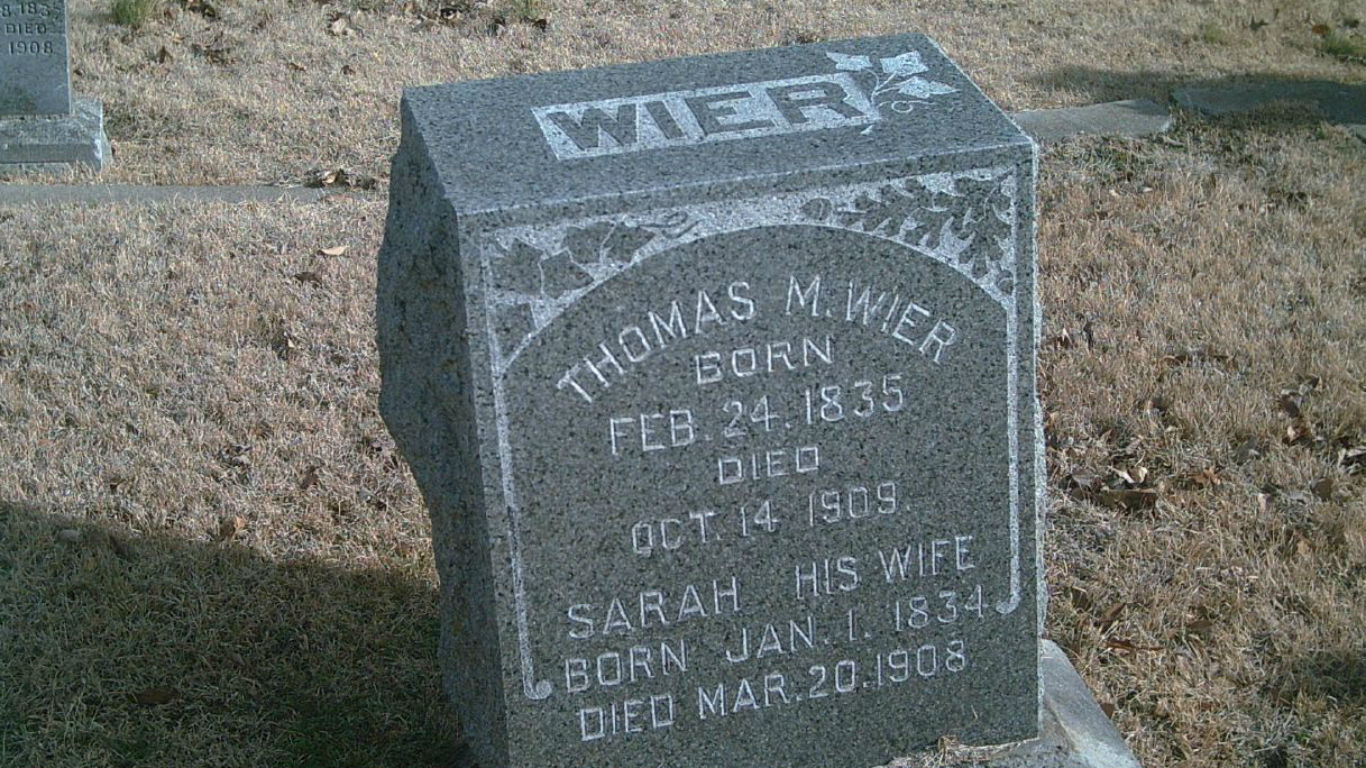
48. Weir, Kansas
> Total characters: 4
> Total vowels: 2
> Population: 528
Weir, pronounced “WEER,” is a coal- and zinc-mining town named after an early landowner, T.M. Weir.
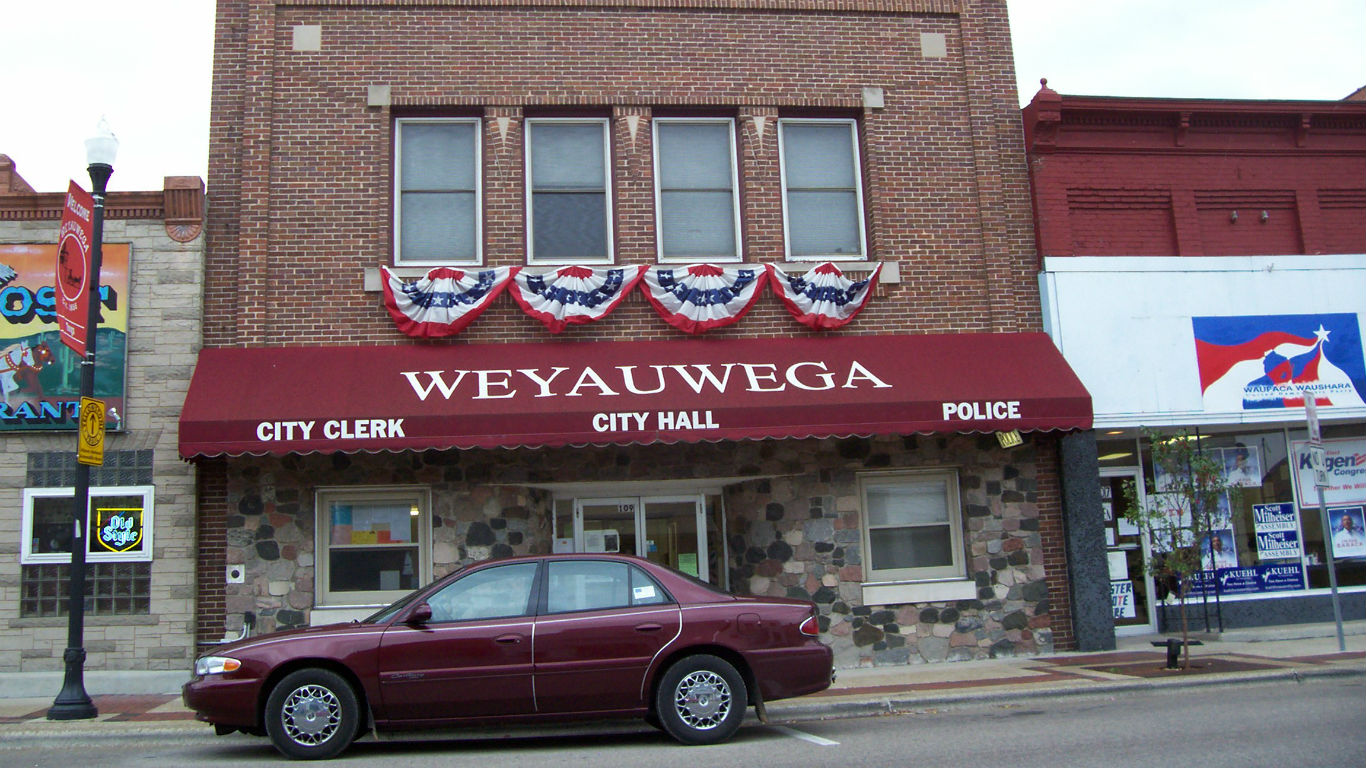
49. Weyauwega, Wisconsin
> Total characters: 9
> Total vowels: 6
> Population: 1,790
Weyauwega means “here we rest” because the location was a stopping between two rivers where Native Americans had to portage their canoes. It’s pronounced “wy-a-WEE-ga,” but the locals just call it “Wega.”
[in-text-ad-2]
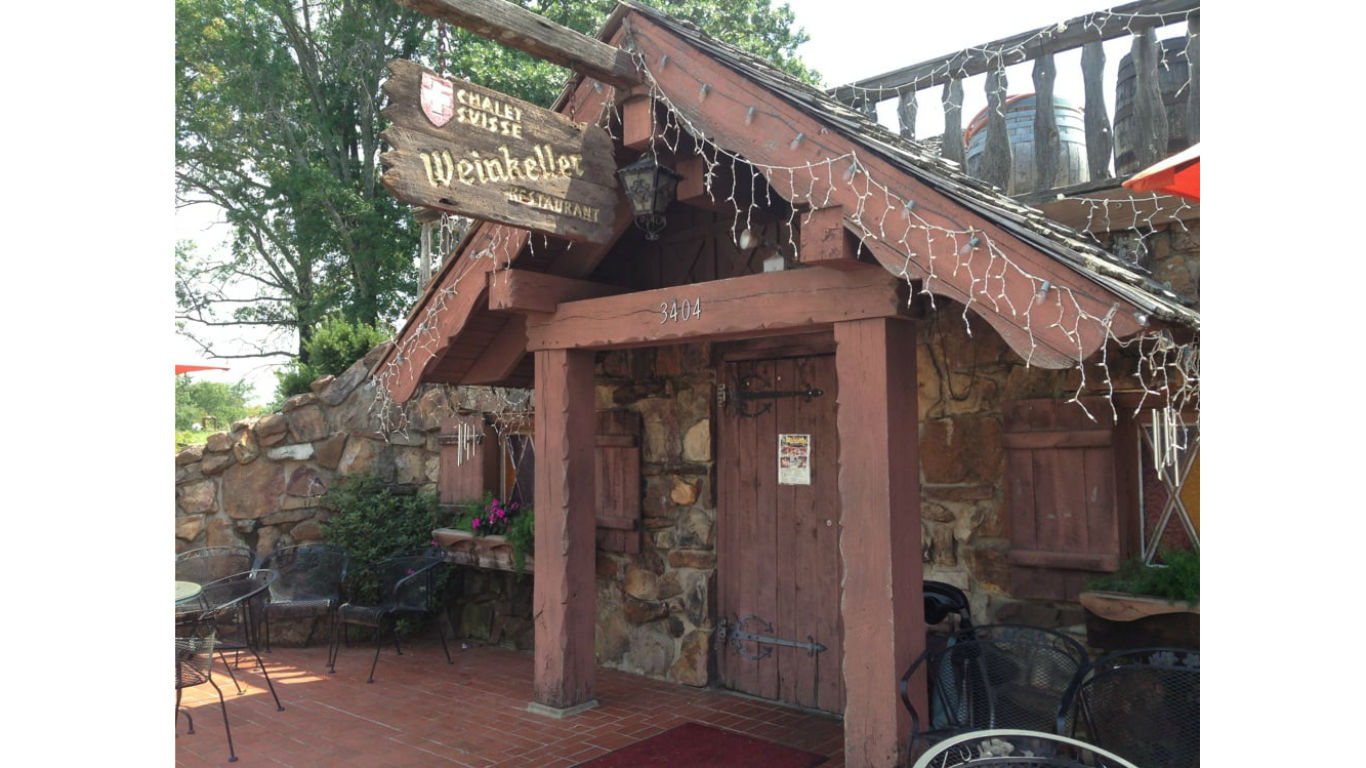
50. Wiederkehr Village, Arkansas
> Total characters: 17
> Total vowels: 7
> Population: 35
Wiederkehr is the name of a winery as well as a village. Locals say it’s pronounced “witter-kur” or “wee-da-kuhur,” depending on how much you’ve had to drink.
The thought of burdening your family with a financial disaster is most Americans’ nightmare. However, recent studies show that over 100 million Americans still don’t have proper life insurance in the event they pass away.
Life insurance can bring peace of mind – ensuring your loved ones are safeguarded against unforeseen expenses and debts. With premiums often lower than expected and a variety of plans tailored to different life stages and health conditions, securing a policy is more accessible than ever.
A quick, no-obligation quote can provide valuable insight into what’s available and what might best suit your family’s needs. Life insurance is a simple step you can take today to help secure peace of mind for your loved ones tomorrow.
Click here to learn how to get a quote in just a few minutes.
Thank you for reading! Have some feedback for us?
Contact the 24/7 Wall St. editorial team.